This information-packed Japan trip planner has the answers to all your questions. Find out the best places to visit, which Japanese foods to try, and how to ride the bullet trains. All the research is done for you to assist in planning a trip to Japan.
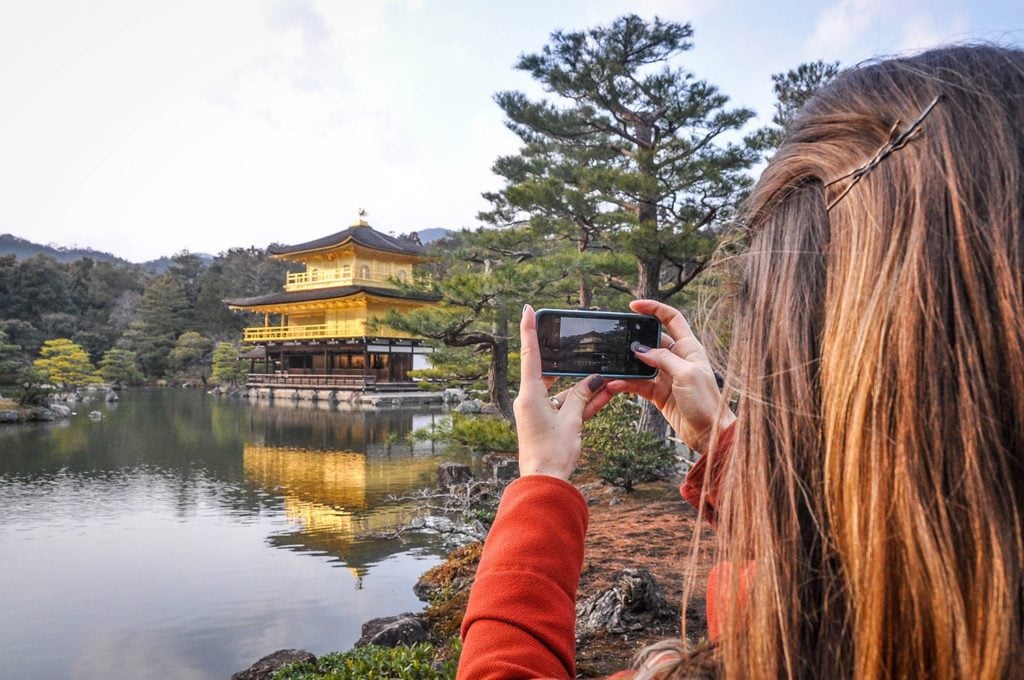
If you have been dreaming of traveling to Japan and want to get serious about planning your vacation, this Japan travel planning guide is packed with all the tips and information that you’ll need to know before your trip to the land of the rising sun.
We’ve traveled to Japan 3 times (and counting!) and have picked up plenty of insider tips. From which foods to try, to how much money to budget, to what travel gear to pack, to the best things to do in Japan.
In this guide, we’re showing you exactly how to plan a trip to Japan by covering everything. And I mean everything!
We’re even answering embarrassing questions like, “What are the toilets like in Japan?”
We’ll also share exactly how much it costs to travel to Japan, plus we’re throwing in some money-saving budget tips! This is the ultimate resource with everything you need to know to get started planning a trip to Japan.

Japan Travel Planning Guide
Wondering how to plan a trip to Japan? You’ve come to the right place!
- Our experience
- Why Japan?
- Important info about Japan
- How long should you spend in Japan
- Best time to visit
- Booking timeline: Know what to book when
- Top places to visit
- Top things to do and see
- Budget
- Transportation
- Practical information for visiting
- Food
- Traveling in Japan with kids
- Japan trip ideas based on interests
- What to pack
- Souvenirs to buy
- Japan travel resources
Our experience
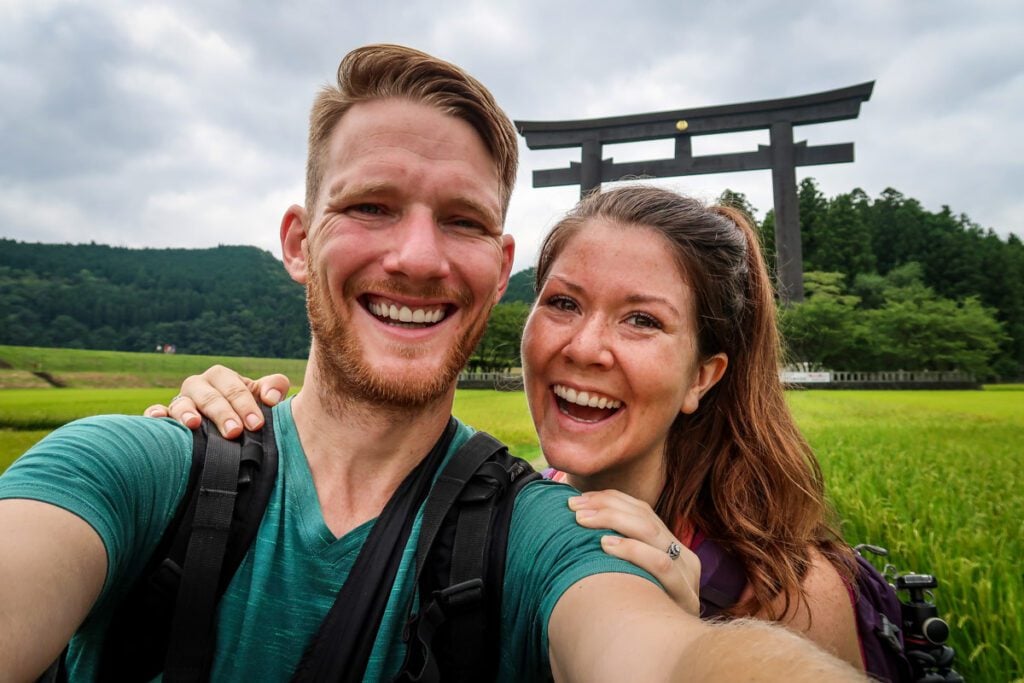
We have personally traveled to Japan 3 times, on 3 very different (equally wonderful!) trips:
- February, 2015: We spent a week in Japan during vacation from our jobs teaching English in South Korea. We squeezed in Tokyo, Kyoto, Osaka, and Hakone, and we were on a super tight budget.
- August, 2019: With a slightly more flexible (but still not huge) budget, we spent 3 weeks revisiting places we loved and beginning to discover some of Japan’s lesser-known sights.
- November, 2023: Toddler in tow, we packed our itinerary with hidden gems and fall foliage. Our budget was more generous, and we rented a car for some of our trip.
In other words, we’ve spent quite a bit of time in Japan and have had tons of different experiences. We absolutely love this country, and we want to share everything we’ve learned about planning a trip to Japan!
If you’re curious to see more about what traveling in Japan is like, we made a video after our first time visiting.
If you cannot see the video, please turn off your AdBlocker. Thanks!
Why should Japan be on your travel bucket list?
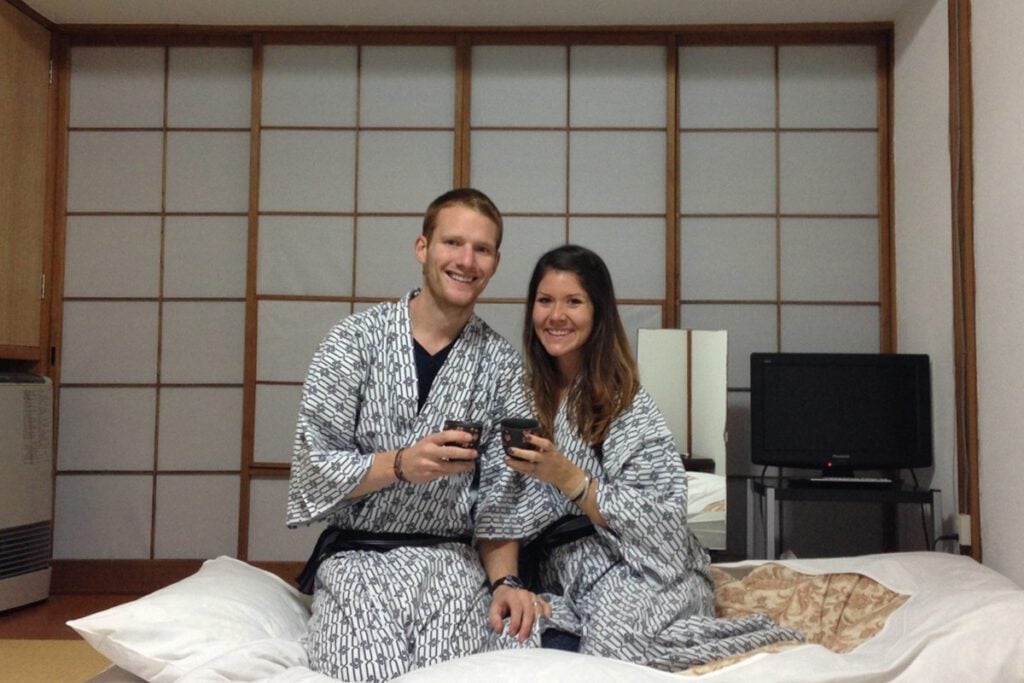
Japan is a country that we wholeheartedly believe has something for every type of traveler. Yes, even you. Whether you’re into history or pop culture, cities or nature, wild nightlife or absolute zen, you’ll find it all in Japan.
While Kyoto, Tokyo, and Osaka make it onto most first timer’s itineraries, you’ll quickly see that there is so much more to this country beyond the main attractions.
Once you travel here, it becomes kind of addicting — you’ll see! — because you’ll realize just how much this country has to offer.
- Incredible foodie experiences
- Epic (and off the beaten path) hikes
- Unique hotel stays you can’t find anywhere else in the world
- Temples and shrines that are shrouded in history
- Beautiful cultural experiences, like tea ceremonies and geisha performances
- Rural villages that few tourists see
- Some of the world’s biggest and safest cities
- Impeccable Japanese zen gardens
I could truly go on and on and on…
We have personally traveled to Japan 3 times and will certainly be back many, many more times.
Read next: We’ve rounded up all the things Japan is most famous for in a guide that’s also packed with practical travel tips. Plus, we’re sharing a few things we personally think Japan should be famous for, but most foreign tourists are surprised to know.
Important info about Japan
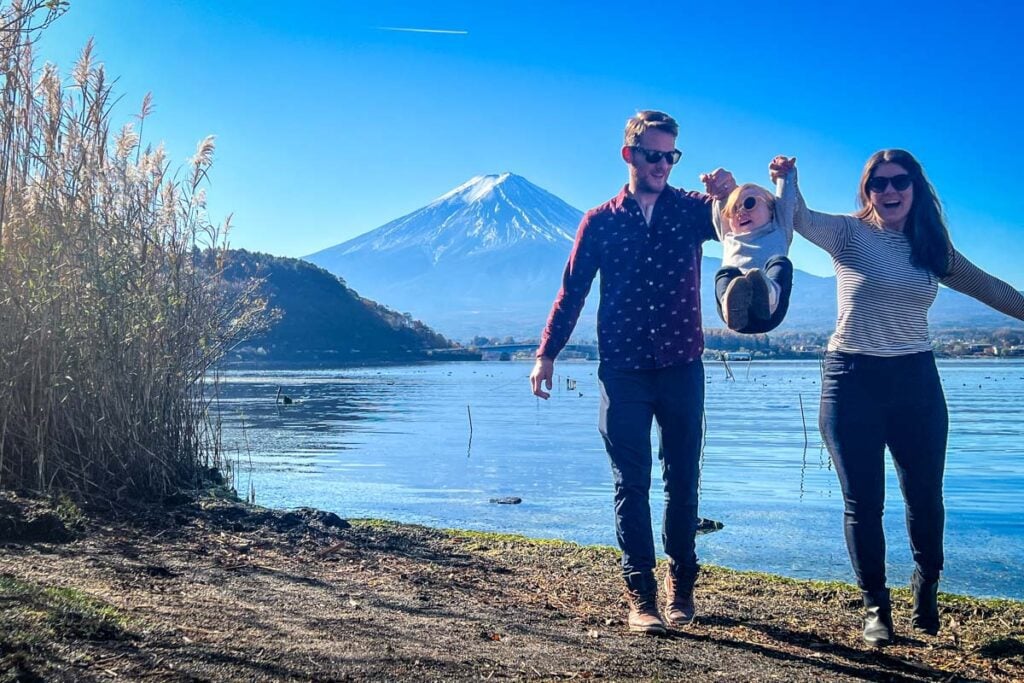
Here is a general overview of some of the high-level important info and things to know before traveling in Japan. We’ll go into more detail about specifics in the rest of this article.
- Location: Island nation in Asia, located in the North Pacific (view on Google Maps)
- Capital city: Tokyo
- Language: Japanese
- Currency: Yen (JP¥ / ¥)
- Plugs/outlet types: Type A and Type B (V100)
- Japan uses the same plugs as in the U.S. but they have a different voltage (100 vs. 120 in the U.S.)
Visa requirements
There are 66 countries in total whose citizens do not require a visa to enter Japan, but the time you can stay depends on which country you’re from.
- Citizens from many countries (including the U.S.A., the U.K., Canada, and Australia) get a visa exemption (aka FREE) 90-day tourist visa, provided they will not be working in Japan.
- Other countries get a temporary tourist visa for a period of 15 days or less.
To find out the specifics for your country, check out the Japan National Tourism Organization, which explains the requirements for each country.
Language in Japan & useful phrases
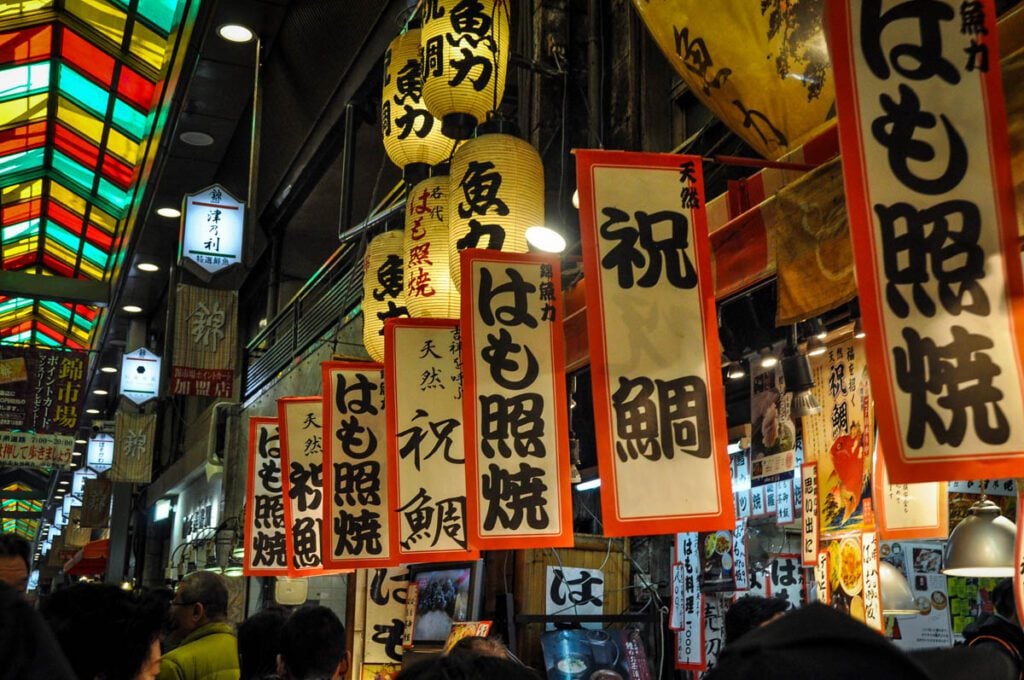
The language in Japan is, quite obviously, Japanese. But many people in big cities, like Tokyo, Kyoto, and Osaka also speak English. Signs are written in Japanese characters, and in the cities most have their Roman counterparts.
When traveling, we always try to learn a couple important phrases. It shows locals you are trying to learn about their country and it can be fun too!
These phrases are ones we have found to be the most useful in any location we visit:
- Hello: Kon’nichiwa
- Thank you: Arigato
- Thank you very much: Domo Arigato
- Beer, please: Biru kudasai
- Cheers!: Kanpai
- Bathroom: Basurumu
- How much?: Ikura
- Delicious: Oishi
- Beautiful: Kireina
Interested in learning more? We’ve got a list of Japanese words and phrases that will be useful to know for traveling in Japan.
Manners and customs in Japan
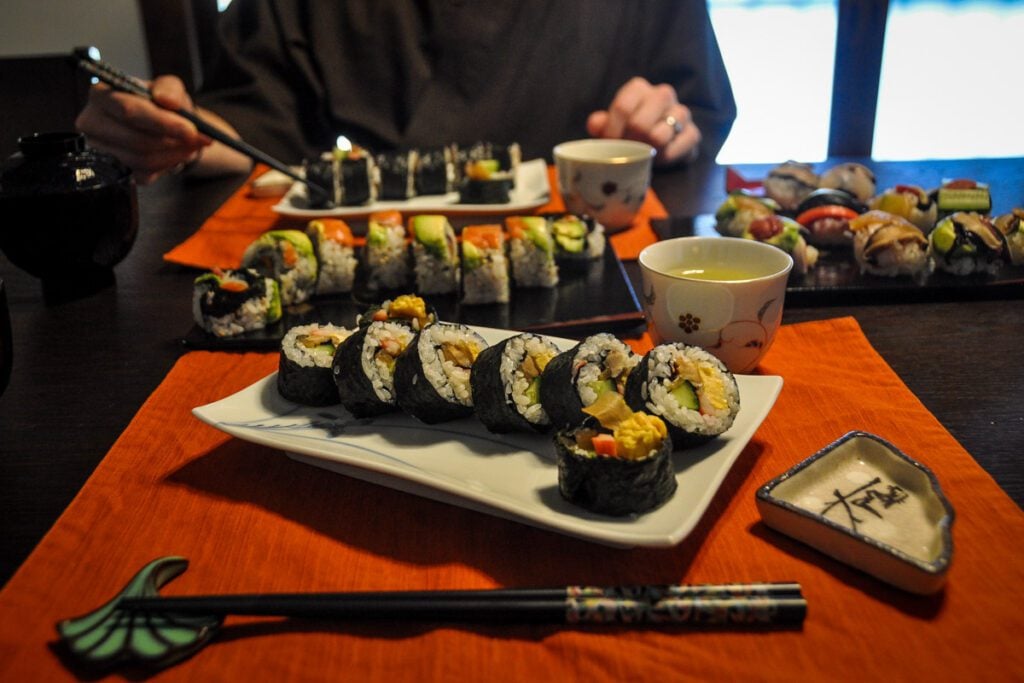
When traveling in a country other than your own, it is always a good idea to do a little research on what is polite so that you don’t accidentally offend people.
Here are couple manners to keep in mind when traveling to Japan:
- Eating while you walk is considered sloppy. Instead, find a place to sit and enjoy your snack.
- Pointing is considered rude. Instead, use an open hand to make gestures.
- Blowing your nose in public can be considered rude. Japanese people often go into the bathroom to blow a stuffy nose.
- On a crowded subway or train, it is polite to take off your backpack and hold it in your hands.
- Slurping noodles not only cools them down as you eat, but it indicates that the meal is delicious. So slurp away, it’s the polite thing to do!
- Taking off your shoes is common courtesy before entering many places. If the floor is raised at the doorway, it is an indicator that you should remove your shoes.
If you want a full run-down, check out our article on Japanese etiquette!
Tipping culture in Japan
Should I tip at restaurants in Japan? This is a question we always ask ourselves once we reach a new country, and it is never fun being caught off guard, unsure of what to do.
In Japan, tips are not expected, and can even be considered rude. And even if the server is not offended, they will likely be confused.
So in other words, NO, you should not tip in Japan.
Religion in Japan
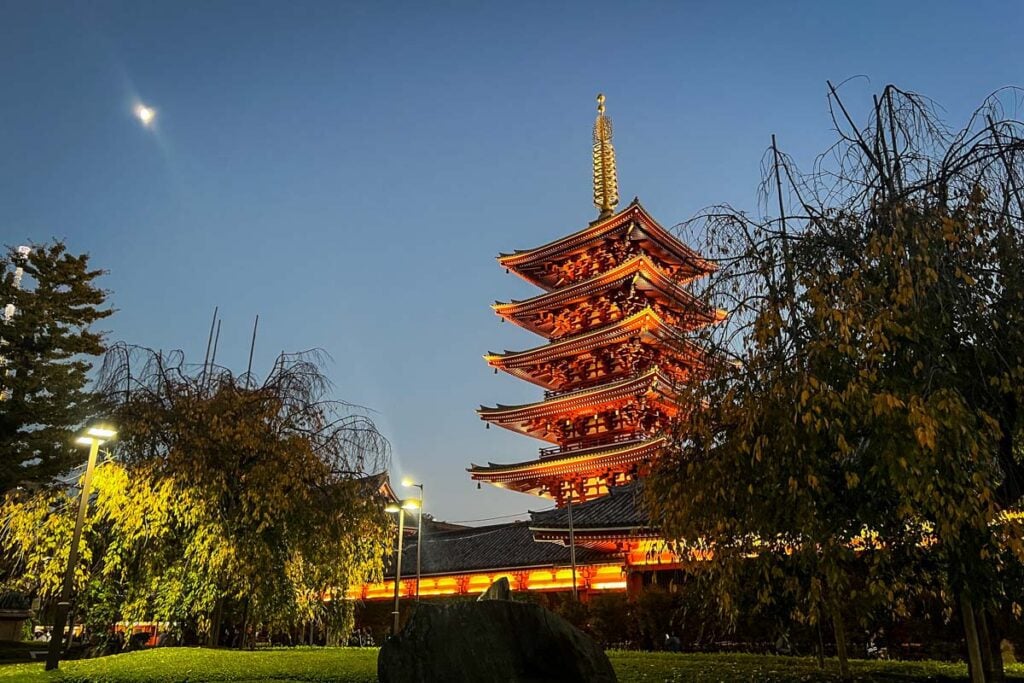
Buddhism and Shinto are the main religions in Japan, though they don’t play a huge role in the lives of many Japanese people today.
All throughout the country, you can visit temples and shrines to get a better understanding of the religions and culture. You can even do a temple stay in order to really delve in and learn about Buddhism.
→ Read this before visiting a temple or shrine in Japan.
Fun facts about Japan
These facts will be good conversation starters with other travelers or even locals. So break that ice and let them in on some fun facts about Japan!
How many days do you need in Japan?
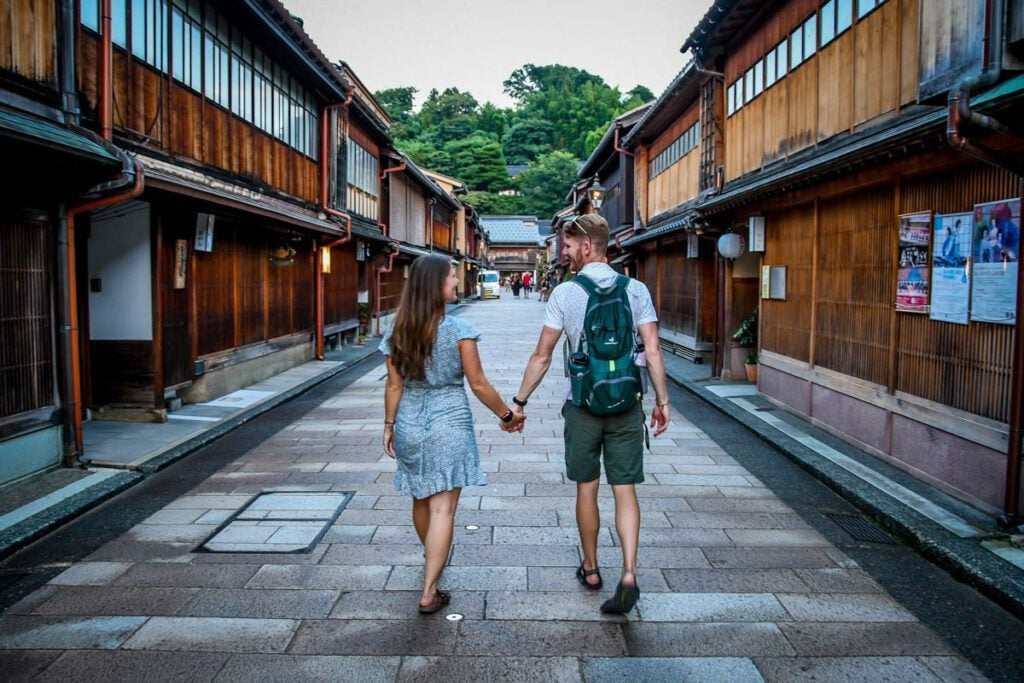
There’s so much to see and do in Japan that it can be overwhelming trying to decide how long your trip should be. Ideally, 2-3 weeks will give you enough time to see iconic and lesser-known sights as well as recover from a long travel day and potentially a big time difference.
But the ideal duration for your trip depends on several factors, including destinations you want to visit and your travel style. Our guide to how many days to spend in Japan will help you figure out how much time you need based on what you want to do.
Best times of year to visit Japan
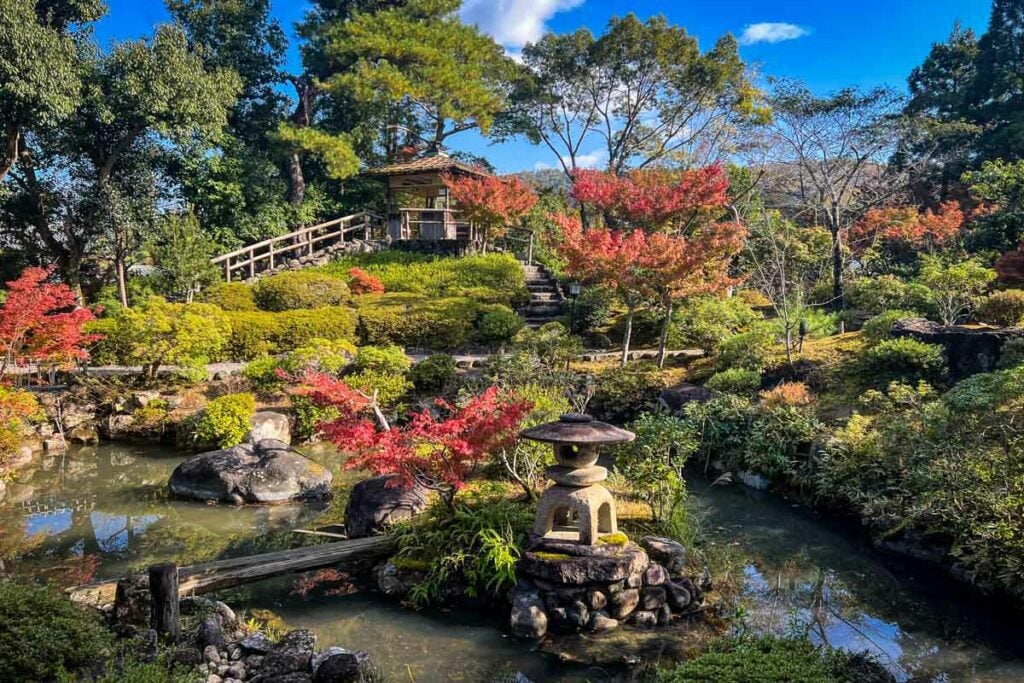
If you’re considering a trip to Japan, you’re probably wondering what time of year is best to visit.
The wonderful thing is every season is a great time to visit Japan, and you will have a completely unique experience.
We’ve laid out what to expect in each season, as well as the pros and cons of visiting during these times in our article: Best Time to Visit Japan: When to Go & When to Avoid!.
Here’s a quick breakdown of the seasons in Japan and why you might want to visit during each.
Summer in Japan
Summer in Japan is the time for festivals and celebrations. The summer spans from June to August, with August being the busiest travel month because school is out and many Japanese people travel over the Obon holiday (August 13-15).
Be prepared for ways to beat the humidity because it can get pretty sticky. Also it’s rainy season and the start of typhoon season, so don’t forget your rain jacket and umbrella!
Autumn in Japan
With typhoon season peaking at the beginning of September, the start of fall in Japan is typically rainy depending on where you are. However, the weather starts to clear up in October and by November the leaves are changing.
We visited Japan in November 2023 and put together this guide to autumn in Japan that’s full of useful info.
Winter in Japan
During the winter months, major cities like Tokyo, Osaka and Kyoto tend to enjoy mild temperatures, but you can find snow and colder temps in the mountains and on Hokkaido (the northernmost island in Japan).
While winter may not be the first season you think of traveling, there’s actually a ton to do, and we think it is a great time to visit Japan.
Spring in Japan
With stunning sakura (cherry blossoms) popping up all around the country and temperatures warming, it should come as no surprise that spring is a popular time to visit Japan. A very popular time, indeed.
If you travel to Japan in the spring, you’ll be rewarded with comfortable temperatures, beautiful blossoms, and lots of crowds.
Before you book your Japan trip in the spring, know this…
Spring is considered by many as a great time to visit Japan for its comfortable temperatures, cherry blossoms and little chance of rain.
One thing you should be aware of is the so-called “Golden Week” which happens in the springtime and is made up of 4 national holidays which fall into a 7-day span. During this week many Japanese people will also be traveling around the country and accommodation and tours are often booked far in advance.
Dates of Golden Week in Japan:
- 2025: April 29 – May 5
- 2026: April 29 – May 5
- 2027: April 29 – May 5
It’s not every year the holidays fall on exact same dates, but for the next 3 years, they just so happen to. This site has more information about Golden Week in Japan.
Booking timeline: Know what to book when
Traveling in Japan is a little different than many other places in the world.
By nature, we tend to be somewhat last-minute travelers, but not when planning a trip to Japan. If possible, we recommend planning your trip to Japan well in advance.
Now, this isn’t to say you can’t plan a trip to Japan at the last minute, but your options for great accommodation (especially in popular areas) will be limited. Plus, you may miss out on some of the most popular attractions because many require advanced booking and tickets go quickly.
We’ve laid out our recommended timeline for planning a trip to Japan so you can ensure you’re able to secure some incredible accommodation and do all the things on your bucket list.
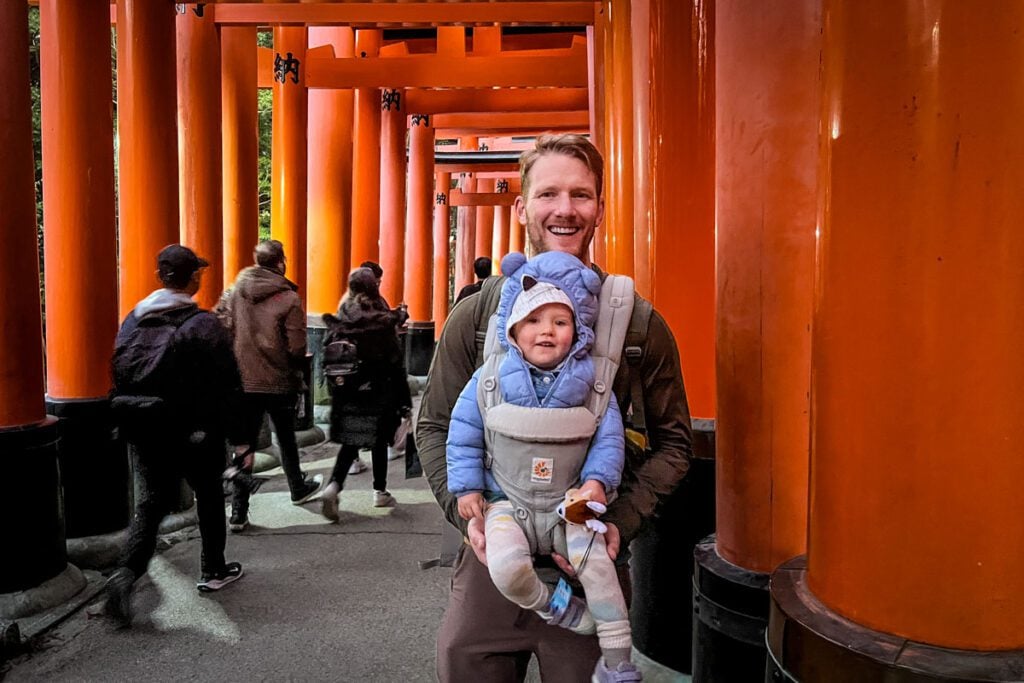
This timeline is a suggestion, but you can certainly adjust dates a bit. Hopefully this gives you a better idea of how far in advance to plan your trip to Japan.
1 year before your trip
- Start researching and draw up your dream itinerary
- Research hotels and ryokans you’d like to stay at along your route
- Make a note of how far in advance the ryokans you like open up reservations
- Flag any attractions that are “must dos” for you
- Come up with an ideal budget (based on research)
- Check out our Japan budget article to get started
- Begin saving for your trip (if you haven’t already)
- Start tracking flight prices so you have an idea of what is average and what is a good deal when you’re ready to book. Set price alerts and check them regularly so you know what is a good deal.
- Insider Tip: Sign up for a mistake fare newsletter and set Tokyo as an “alert city” so you can get notified of any really good deals departing from your home airport.
The research phase should be fun and you don’t want to feel rushed. We recommend recording all the hotels and attractions you want to prioritize in a Google Doc so you don’t lose any of your research.
Coming up with a budget will help you determine which accommodations you can realistically book and it will help you start saving for this trip.
6 months before your trip
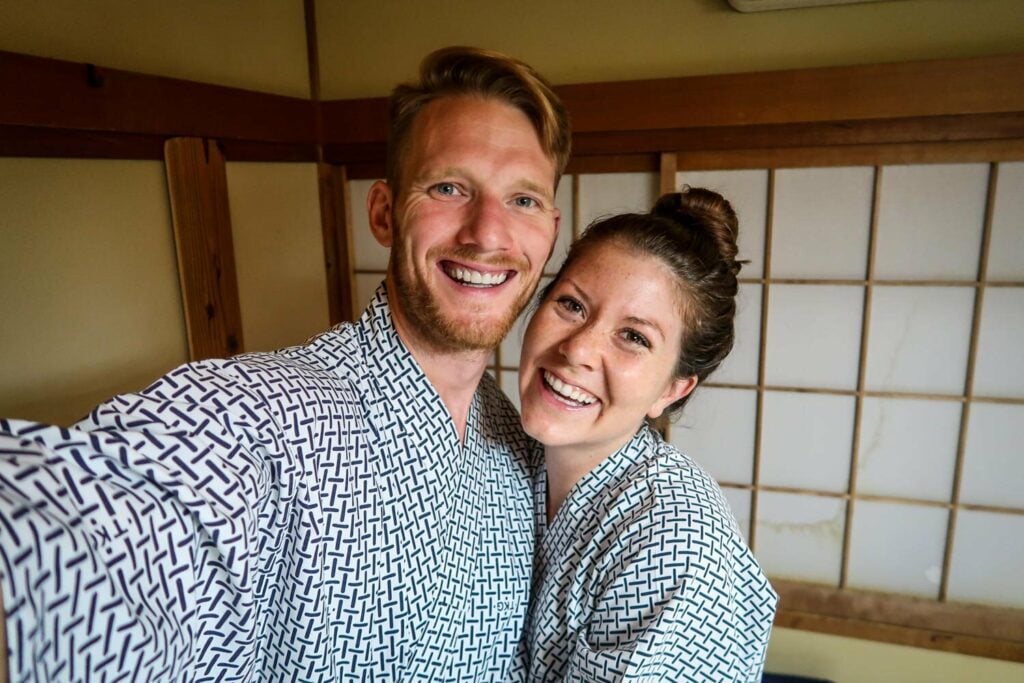
- Flights: If you are flying from afar, aim to book your flights around 6 months prior to your trip. We’d recommend keeping an eye on them for a couple of months (starting 10 months before your trip).
- Key accommodation: You will want to start booking key accommodations at the 6-month mark before your trip. This includes:
- Ryokans: Many ryokans only release booking dates 3-6 months ahead of time. Really great ryokans fully book up quickly after dates are released.
- Accommodation in small towns (like on the Nakasendo Trail)
- Hotels near any major attraction or popular area (at DisneySea, or near Mount Fuji)
- Special hotels that you really want to stay at (like the Park Hyatt in Tokyo, or a temple stay at Koyasan)
- Accommodations that fall over festival dates or popular tourist seasons, like Golden Week (which falls during Japan’s cherry blossom blooms)
It can feel a little overwhelming to make these big bookings all at once, but it will ensure you are able to stay where you’d like and secure good prices on flights.
Booking tips: When possible, we like to use Booking.com since many hotels offer free cancellation via this platform (often up until just days before your stay). Also, you often don’t have to pay at the moment of booking, which makes the commitment a little less scary.
We typically like to compare the price on Booking.com to Agoda, as they sometimes differ. We also stayed at a couple of Airbnbs in Japan, which was a good option in the more rural areas.
→ Related: We’re sharing our genius system for booking a great hotel or Airbnb every time!
2-3 months before your trip

- All accommodation not yet booked: the sooner the better for the best locations and prices
- Japan Rail Pass: You can purchase this pass up to 3 months before the date you’ll use it. We personally got ours 2 months in advance so it wasn’t left until the last minute.
- Rental car: If you choose to rent a car in Japan, you’ll want to book it roughly 2 months in advance just to secure it for your preferred dates, time, and location
- FYI: we have lots of advice and info about renting a car in Japan
- teamLab Planets & teamLab Borderless
- Tickets go on sale 3 months in advance
- If you want best available times slots (we recommend the first one at 9-9:30 a.m.), book at least 2 months ahead of time
- Compare availability on the teamLab website (tickets available further in advance) and on GetYourGuide
- Harry Potter Studio Tour (Tokyo)
- Tickets go on sale roughly 5 months in advance. We recommend booking at least 2-3 months in advance for the best availability of time slots.
- Compare availability on the Warner Bros Studio website and on Klook
- Universal Studios fast pass (Osaka)
- This will mean you don’t have to wait in crazy long lines, and we’ve heard it’s very worthwhile at this notoriously crowded theme park. Purchase it here.
1 month before your trip
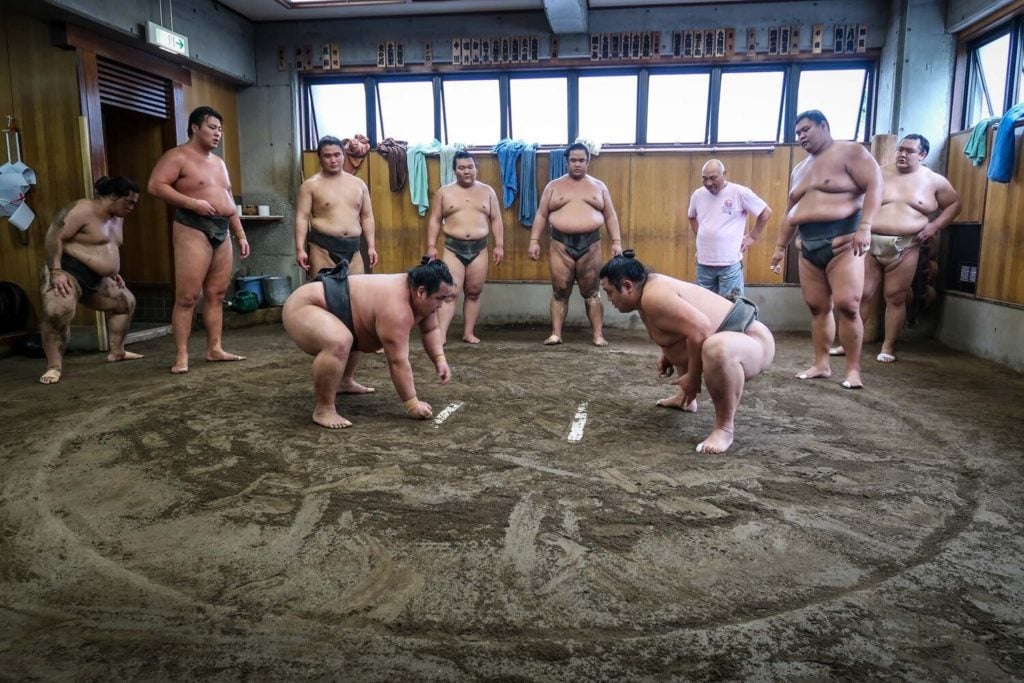
- Ghibli Museum (Tokyo)
- Tickets go on sale on the 10th of each month for the following month
- We recommend setting an alarm to purchase tickets when they become available on the 10th of the month before your trip so you don’t miss out.
- You cannot purchase tickets onsite (you must have advance reservations)
- Shibuya Sky (Tokyo)
- Tickets go on sale 1 month in advance
- The most popular time slot is right before sunset and those times go quickly
- Compare availability on the Shibuya Sky website and on Klook
- Popular theme restaurants like Ninja Restaurant (Tokyo) or the Pokémon Café (Tokyo & Osaka)
- Top-rated restaurants: Popular restaurants that allow reservations must be booked in advance.
- Insider tip: For the restaurants on your “must” list, research and write down how far in advance reservations are available (some may even require booking further than 1 month in advance). Set alarms in your calendar so you can be sure to snag a spot right away. Popular places fill up very fast!
- Tours: Most general tours should be able to be booked 1 month in advance. However, if you have your itinerary dates set earlier, it’s a good idea to make those reservations so you get the best availability of time slots. Here are some of the tours you might want to book:
Download the PDF version of our Japan booking timeline so you can print it out at home and keep track of your Japan trip planning process! Enter your email and we’ll immediately send the booking timeline to your inbox (totally FREE).
We’ll also be sending you bonus tips on all things Japan, like how to travel cheaply, where to go, and the best places to stay.
We value you, and NEVER spam. (We hate spam too.)
Top places to visit on your Japan trip
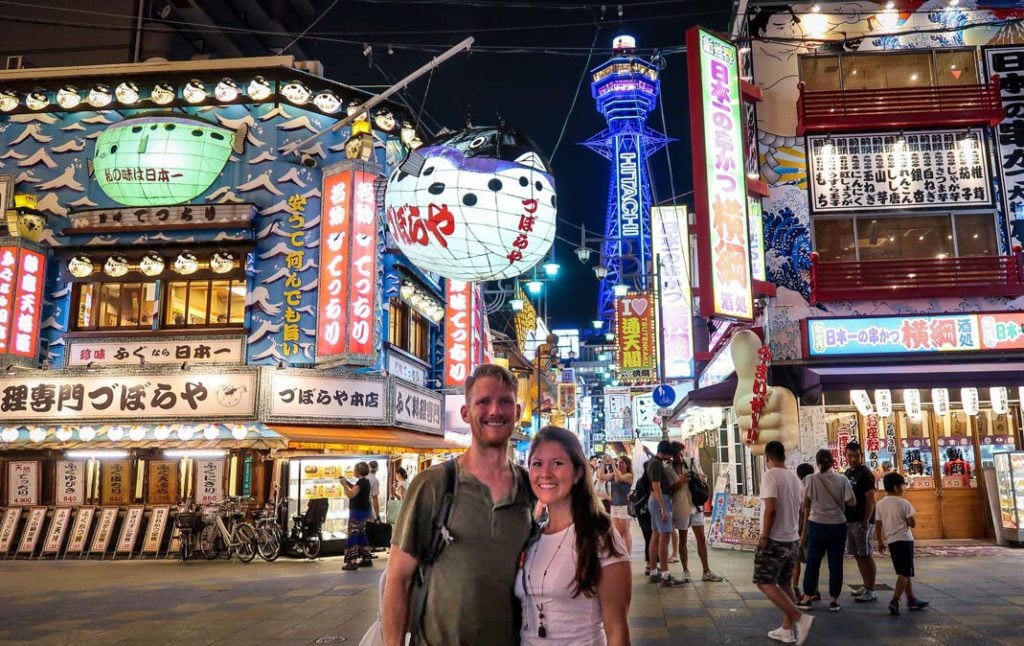
Japan is a huge country, and it would be an extensive list if we went through all the notable cities to visit. But if you are visiting Japan for the first time, these cities are a good place to start as they will give you a good taste of the country’s culture.
Another thing that’s important to keep in mind when planning a trip to Japan is the destinations’ proximity to one another, and all of these suggestions are relatively easy to get to and from.
- Tokyo: This huge metropolis is likely where you’re flying in and out of, and it is one of the most interesting cities we’ve visited anywhere in the world. From quirky experiences to amazing foods, Tokyo is definitely worth some time on your itinerary.
- Kyoto: Considered the “cultural capital of Japan”, Kyoto is packed with history, important temples, gorgeous architecture and a charming atmosphere. If you are traveling with your little ones, there are tons of things to do in Kyoto with kids.
- Osaka: Another major hub to fly in and out of Japan, Osaka is worth a visit. Known for lively nightlife and endless street food, there’s a lot more to discover beyond Osaka’s neon-lit facade.
- Hakone: At the footsteps of Mt. Fuji, Hakone is a peaceful retreat from the big cities of Japan and a chance to relax in an onsen and sleep in a ryokan.
- Hiroshima: This historical significance of this city draws tourism from all over the world, but you can enjoy the lighter side of this beautiful place too.
- The ‘Roof of Japan’: The Tateyama Kurobe Alpine Route is a single day mountain traverse where you take 8 different modes of transportation over what’s known as the Roof of Japan.
Want more info? We have an entire article with a round up of the most beautiful places in Japan, including some top things to do and see.
Psst! Are you trying to choose whether to visit Osaka or Kyoto on your Japan trip? Both are worth it if you have the time. But if you can only pick one, our Kyoto vs. Osaka guide can help you decide!
Top things to do in see in Japan
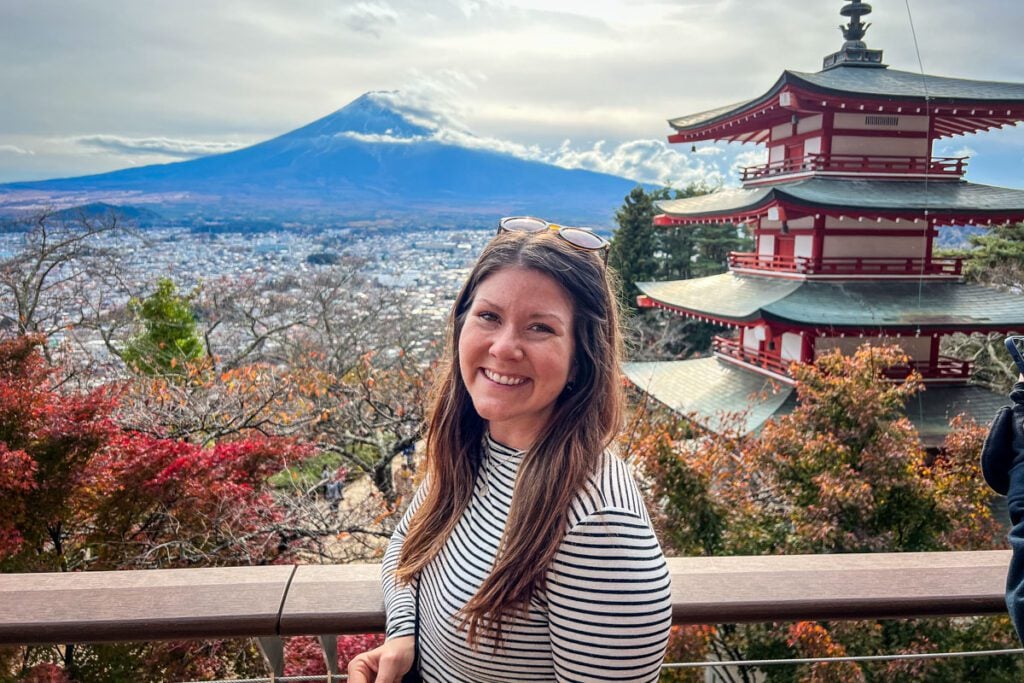
Just as with places to visit, there are seemingly endless sights to see in Japan. Here is a quick list of our top recommendations for your first visit to Japan.
- Mount Fuji: The most famous mountain in Japan, you can get a glimpse of this beauty when traveling in Hakone.
- Fushimi Inari Taisha Shrine: Known to tourists as the “Orange Gates”, there are thousands of majestic orange gates covering a maze of paths leading up to the shrine.
- Arashiyama: Located on the western edge of Kyoto, Arashiyama is an area that is filled with temples and shrines, but the main attraction is the Arashiyama Bamboo Grove.
- Temples in Japan: Of course temples will be on your list of things to see in Japan. The Golden Pavilion in Kyoto is stunning with the garden setting and reflection off the pond.
- Shibuya Intersection: Famously known as the “busiest intersection in the world” crossing the street here is quite an experience.
These places all make for great pictures! If you want to take better travel photos, we wrote up some easy and creative tips to improve your travel photography skills!
→ Psst! We have a list of must-see landmarks in Japan that’s sure to give you some inspiration for your itinerary!
Unique experiences to have on your Japan trip

One of the many reasons Japan is such a wonderful place to visit is there are so many unique experiences that can only be had in this country. Here are just a few of the things that are quintessentially “Japanese”.
Quintessential cultural experiences
- Soak in an Onsen: Strip down to your birthday suit and soak in a hot tub until you get pruney. Don’t worry, they are gender separated and some are even private. The best one we dipped in was in the Hakone region.
- Psst! Before you start shedding your clothes, be sure to read up on proper onsen etiquette to avoid making any embarrassing mistakes.
- Stay at a Ryokan: Experience a traditional Japanese-style inn and stay in a ryokan to enjoy Japanese hospitality and relaxation.
- Take a Japanese cooking class: Learn how to make proper sushi or traditional ramen to impress your friends at home. (Read why we LOVE taking cooking classes on our travels!) Or take a food tour, like this Kyoto food tour from Magical Trip.
- Sleep in a Temple: Usually taken as retreats to refresh your body and mind or deepen understanding of religion, temple stays are an unique experience you won’t forget.
- Go Geisha spotting: On the old street of Kyoto, Geisha scurry from one event to the next. Try to get a glimpse of them, or better yet try to get a picture.
- See the fish auction each morning: Show up around 3 a.m. (yep, that early) as the fishermen come into port and sell their fish at the Tsukiji Fish Market. Then find a shop and have the freshest sushi you’ll ever eat.
- Watch a Sumo wrestling match: There are 6 sumo matches held each year. If you’re lucky enough to be there at the right time, don’t miss the opportunity! Three matches are held in Tokyo (January, May and September) and one each in Osaka (March), Nagoya (July) and Fukuoka (November).
- Take a Sumo wrestling tour in Ryogoku and learn about Sumo culture.
Get personalized recommendations for where to save and splurge during your trip when you use ViaHero—a trip planning platform that will connect you with a local in Japan.

Quirky Japanese experiences
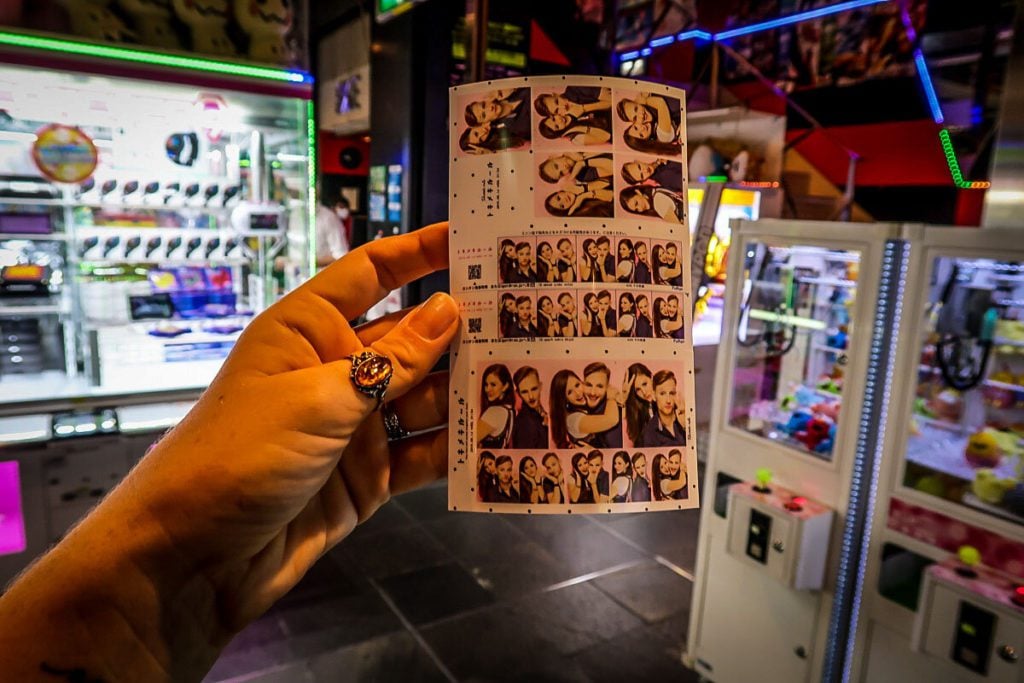
- Take your picture in a photo booth: Pop into one of these with your friends and take a few snaps. Then, edit your photos instantly, enhancing your eyes, adding blush, or slimming your cheeks. It takes the word selfie to a whole new level.
- Themed Cafes: From vampire cafes to butler cafes to prison-themed restaurants, there are quirky cafes for every interest. There are also animal cafes such as dog and cat cafes too.
- Responsible Travel Tip: Be cautious about animal tourism. Domesticated animal cafes (like dog or cat cafes) seem to take care of their animals. But for non-domesticated animals cafes, like owl cafes, we would just be a little hesitant to visit.
- Theme restaurants: We went to the Robot Restaurant in Tokyo (unfortunately now closed) and it was one of the craziest dinners we ever attended! For more theme restaurants, check out our guide to the best things to do in Tokyo at night.
Unique experiences in nature
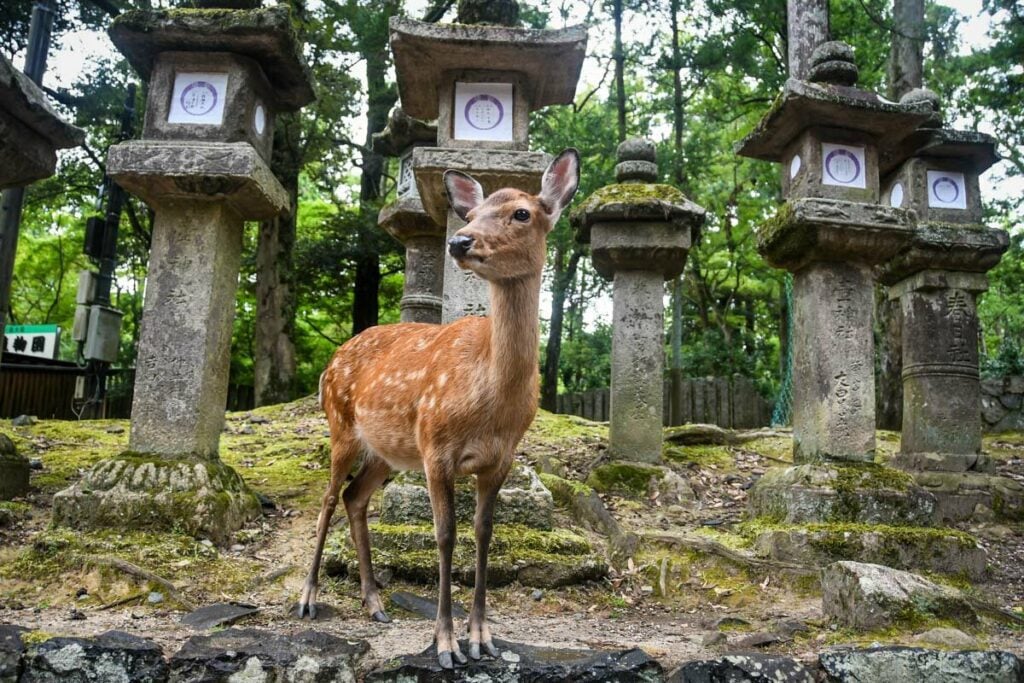
- See the Nara Deer: Just a little ways outside of Osaka in the city of Nara, there is a park (and part of the city) literally flooded with cute spotted deer. They’re used to being around humans, but make sure you read these tips before visiting the Nara deer.
- Jigokudani Snow Monkeys: A few miles away from Nagano, there is a park where the local macaques monkeys soak in a spring-fed hot tub and play around in the snow.
- Hike the Kumano Kodo Trail: If you’re feeling adventurous, this is quite literally, off the beaten path. The Kumano Kodo Trail is a historic pilgrimage through the mountainous Kii Peninsula that has been trekked for thousands of years.
Need more inspiration? We have an entire article with a round up of the best things to do in Japan, including all the info you need to make it happen during your visit!
Wanna take a tour?
We recommend taking a tour with the highly-rated tour company, Magical Trip. They specialize in small group tours led by local guides all over Japan, from Tokyo to Osaka.
Click through to browse all small group Japan tours they offer.
Budgeting for Japan
I’ll be straight to the point: Japan is not cheap.
Contrary to many other destinations in Asia, like Thailand or the Philippines, Japan is not an ideal location for budget travelers. That said, it is unlike any country in the world and totally worth visiting.
Typical daily budget for Japan
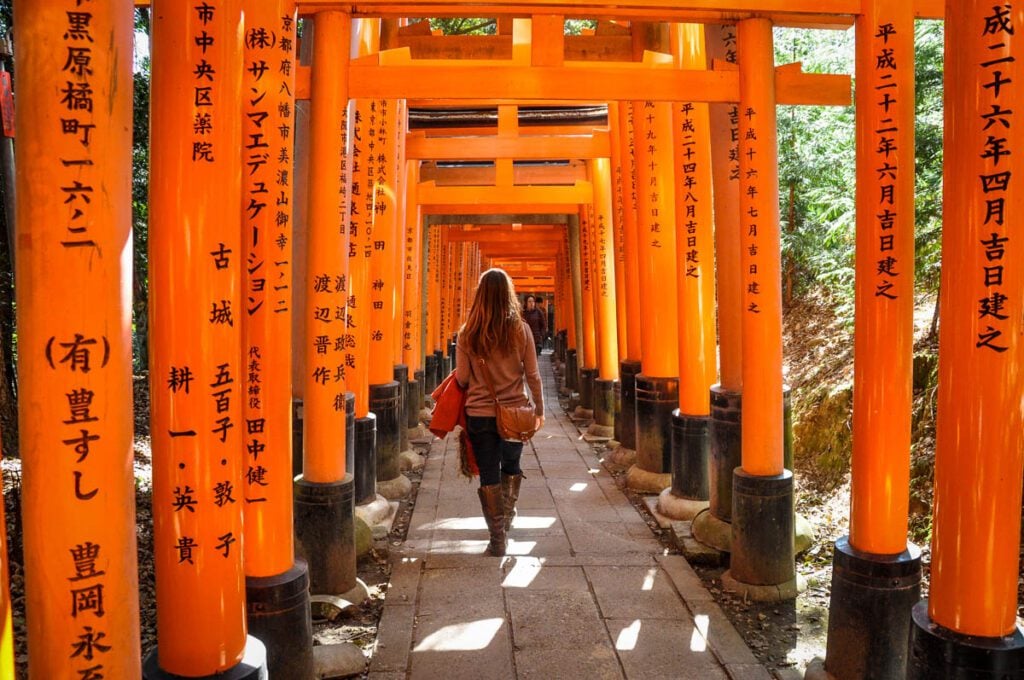
Below is an estimated breakdown of (about) how much money you should plan to budget for a trip to Japan based on your travel style.
*Note: These are estimations for one person and do not include flights.
- Budget Traveler: $735 USD per week
- You’ll stay in hostel dorm beds, grab breakfast from one of the many 7-Eleven’s or Family Marts, and do as many free activities as possible.
- Mid-Range Traveler: $1295 USD per week
- You’ll be staying in comfortable, though not fancy, hotels or Airbnbs. You’ll want to try lots of Japanese food—both budget meals and a couple nicer ones too. You will use public transportation to get around and you want to see as much as possible, but you’re willing to make some sacrifices to save money.
- High-end Traveler: $2,000+ USD per week
- Budget isn’t too much of a concern for you. This isn’t necessarily luxury travel, but you are willing to pay more money for convenience and comfort; and splurging on unique, once-in-a-lifetime experiences is not a problem for you.
Japan travel planning tip: This article breaks down the exact cost of a trip to Japan. Based on our own experiences traveling in Japan, we share the costs associated with each portion of our Japan trip — from transportation to food to accommodation to entertainment.
Psst! If you want to know how we afford to travel (& how you can too!), we think you’ll love this article!
Are credit cards accepted in Japan?
Yes, but hold up…
Major credit cards will typically be accepted at big hotel chains, nice restaurants or shops in large cities, but you’ll want to have cash on hand to use in small restaurants, markets or in more rural towns.
There are still many places where credit cards are not accepted, so it is a good idea not to rely on plastic alone.
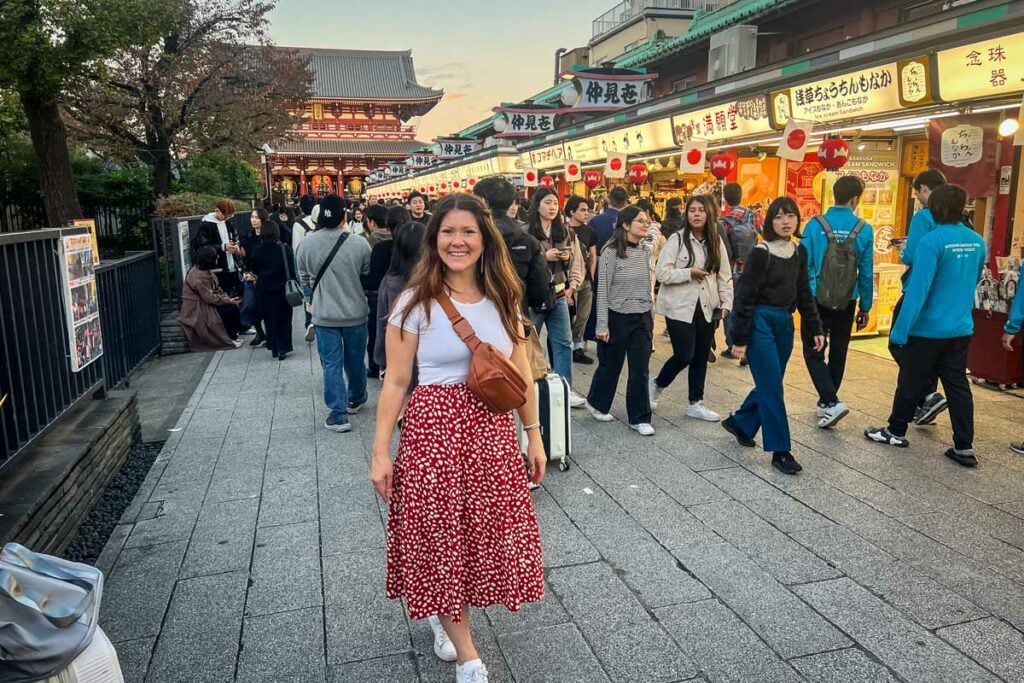
Should I get money from my bank before my trip to Japan?
This is a question we get all the time. The answer really comes down to your personal preference, but we never get money out in advance before international travel.
Whenever we enter a new country, we walk right past the Currency Exchange counters (they are a huge rip off most of the time!) and we go to an ATM to withdraw cash. You will get the best exchange rate by withdrawing foreign currency from an ATM.
If the thought of showing up in a new country without cash on hand makes your hands sweaty, then by all means ignore this advice and grab some yen from your home bank before you leave.
But I will say that airports always have ATMS, and they are easy to find in train stations as well as in 7-Eleven’s and Family Marts in most big Japanese cities.
Before heading to a rural town though, be sure to take out cash just in case you can’t find an ATM.
Credit card travel tips
- Turn on travel notification: Be sure to alert your bank ahead of time that you will be traveling, and where, so they know your transactions aren’t fraud.
- Have a backup card: It’s a good idea to carry more than one card in case you have an issue with one of them. Remember to always pack them in two different places within your luggage — for example, one in your wallet and another in your backpack so if one gets lost or stolen, you still have access to the other.
- Invest in a debit card with no fees: We have a checking account with Charles Schwab, and they reimburse every single ATM fee. This means we never have to take out more money than we feel comfortable with carrying at a time. Try looking into accounts with similar benefits. It will save you so much money on your travels.
- Check out which travel credit cards we personally recommend.
Money-saving tips for Japan
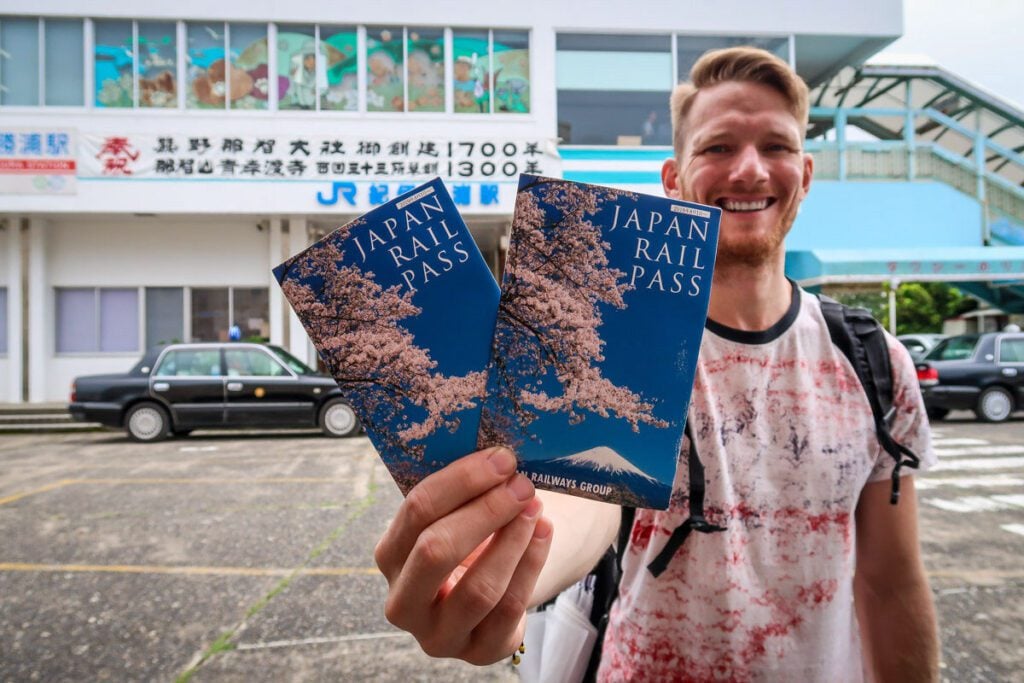
While it’s not a cheap country to visit, there are certainly ways you can save money while traveling in Japan.
- Buy a Japan Rail Pass if you plan to venture outside of Tokyo.
- This article breaks down how much the Japan Rail Pass costs and how to purchase it.
- Get your breakfasts and snacks at 7-Eleven or Family Mart (they are everywhere around the country!). While you might never consider eating at a convenience store in your home country, the fresh food options are surprisingly good at these stores in Japan. I’m not joking. You’ll see many locals doing the same.
- Have your biggest meal midday and take advantage of “lunch sets” which often consist of a large meal (sometimes with a dessert) and are typically between $5-7 USD.
- Conveyor belt sushi is a good way to try all the types of sushi your little heart (and stomach!) desire without a huge price tag. Plus, it’s a fun experience in itself!
- Use an app to record your spending and see how well you’re staying on top of your budget! We find it’s much easier to overspend when you don’t know how much it’s all adding up to. We love Trail Wallet for recording our expenses. (We’re not affiliated with them, we just love using it ourselves!)
- Download a converter app on your phone like this one to see the exact exchange rate for your selected currency at the time of your trip, so you always know exactly what you are spending.
Transportation in Japan

The trains and metros in Japan are some of the cleanest and most efficient in the world, and the rail system covers almost the entire country making it a very efficient way to get around.
However, transportation is one of the biggest expenses to factor into your Japan travel budget.
Travel by train in Japan
We have an entire guide to navigating the Japan Rail system and whether or not getting a J Rail Pass is worthwhile for your trip, depending on your itinerary.
Likewise, if you are just planning to spend your time in Tokyo and trying to figure out how to navigate the metro, you can find that info in our Tokyo article.
Renting a car
While we love the ease and efficiency of Japan’s public transportation system, we rented a car during our most recent trip to Japan and we absolutely loved it.
Having our own car was really convenient, especially now that we’re traveling with a toddler. Plus, it gave us the opportunity to get off the beaten path and explore places with very few tourists that would be difficult to visit via public transportation.
I think we will forevermore be renting cars when we visit Japan, even if just for part of our trip.
We have a guide to renting a car in Japan (packed with lots of driving tips you won’t want to miss!).
What are the trains like in Japan?
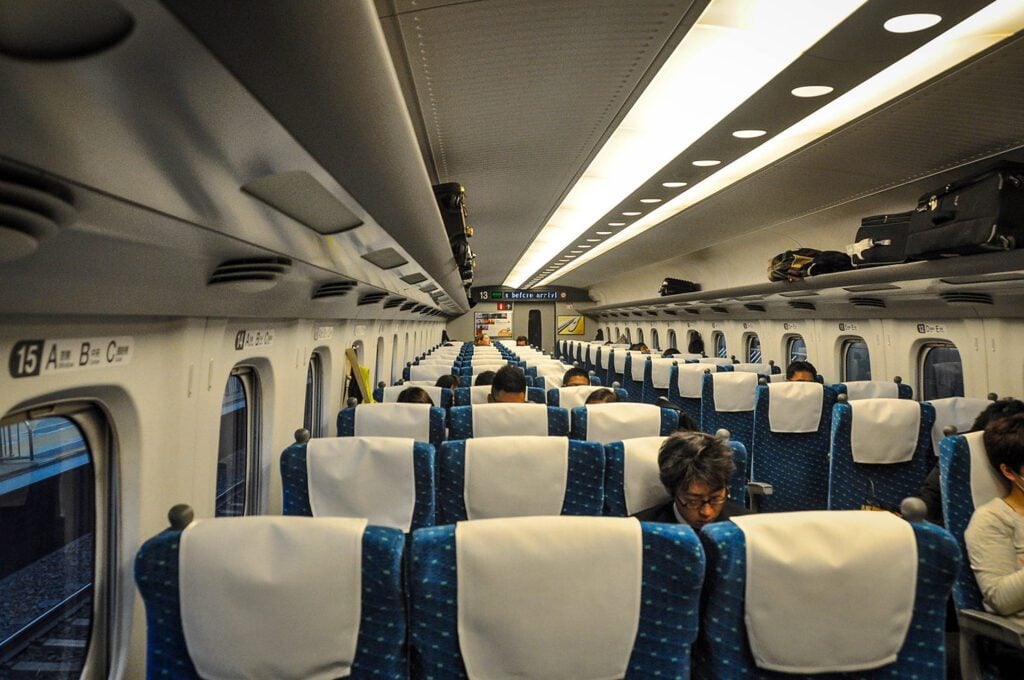
Overall, the trains are clean, comfortable and efficient. The rail system covers almost the entire country, making it a wonderful way to get around. This article goes into detail with everything you’d ever want to know about the Shinkansen Japanese Bullet Trains.
Practical information for visiting Japan
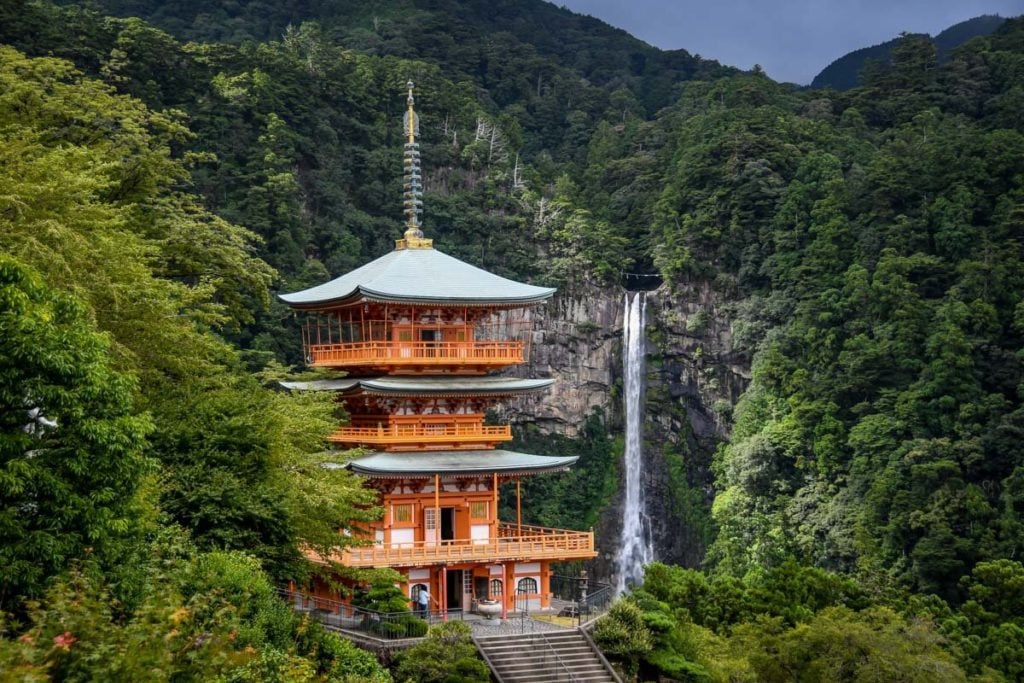
Traveling in Japan for the first time can be overwhelming to plan if you aren’t sure what to expect. A lot of questions can arise that you may not think about with other travel destinations.
We have an article with our top Japan travel tips and advice. This article goes over all the dos and dont’s for traveling in Japan.
We’ve done our best to narrow down some of the more practical information and answer some specific questions about traveling in Japan.
Do I need travel insurance for Japan?
While it’s not required to enter the country, we always recommend purchasing travel insurance before any trip. It is a small price to pay for the peace of mind you’ll have knowing you will be covered in case of an emergency or if anything is stolen.

For a trip to Japan, we’d recommend getting a plan with Safety Wing insurance. They make it easy to get a quote for the exact duration of your trip and offer the most comprehensive coverage at the best rate.
Check out our travel insurance comparison article for more information on how to pick a policy and what we look for in travel insurance.
How safe is Japan?
Japan is overall very safe and crime is low.
I once met a girl who was an English teacher in Tokyo, and she said she left her wallet in a train station. It sat there, untouched, and the next day when she retraced her steps it was in the same (heavily trafficked) place she had left it.
But even though theft isn’t common in Japanese culture, that doesn’t mean it can’t happen to you. As with any place in the world, always be aware of your surroundings and use common sense.
This is another reason we always recommend getting travel insurance to make sure you’re covered in case anything gets stolen or you run into other emergencies.
Do I need a power converter in Japan?
In Japan the standard voltage is 100 V and the power sockets are type A and B (pictured below). The socket is the same used in North America, but the voltage is lower, so yes you will need a power converter for electronics that don’t already have a converter.
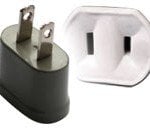
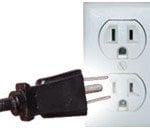
This website is a super helpful resource when it comes to electricity all around the world. Simply select your home country and it will tell you if you need a converter and/or plug adapter for your visit to Japan.
We recommend this all-in-one converter-adapter that works in any country. This means you only need one item no matter where your travels take you!
What are the bathrooms like in Japan?
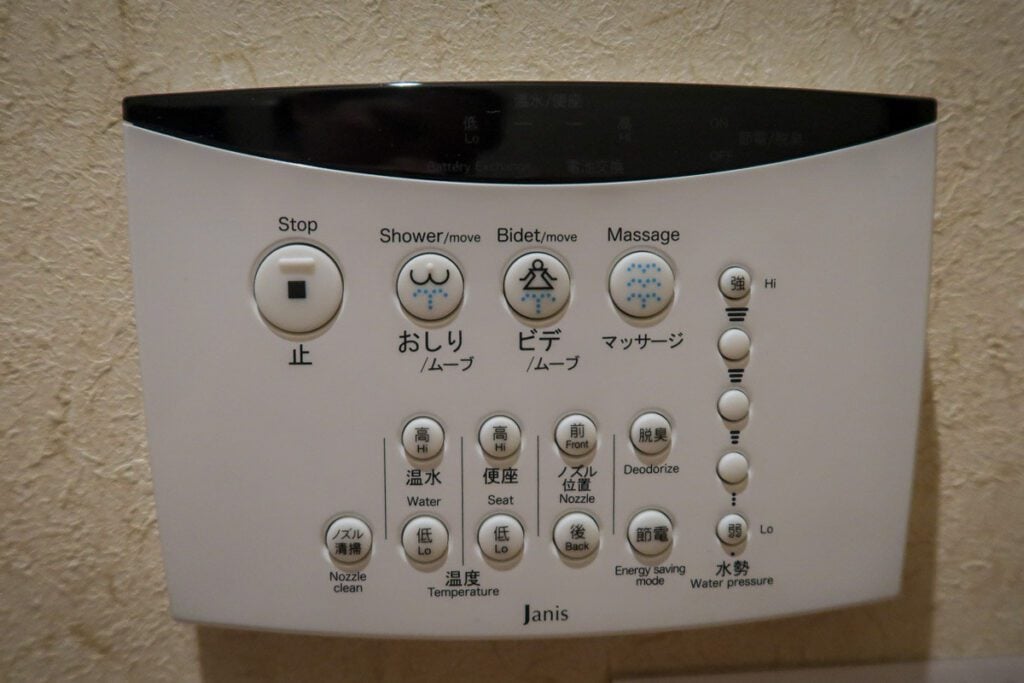
This might be an embarrassing question to ask out loud, but I promise you aren’t the only one thinking it. If it’s your first time visiting Japan, you likely have no idea what to expect when it comes to bathrooms.
The good news is, many bathrooms around the country are very nice and quite… luxurious.
In nicer restrooms, you’ll find toilets equipped with a built-in bidet to spray your bum. And some toilets even have buttons that will play music or rainforest sounds to cover up, well, you know…
Be warned though that in some train stations or in more rural parts of the country, you may find squat toilets similar to ones you’d find in many places around Asia.
How to get cell phone service in Japan
There are two common options for staying connected to data while traveling in Japan: pocket Wifi and local SIM card. This article does a great job of comparing the two and giving our honest opinions about which worked best for us.
Helpful (& free!) apps for travel in Japan
We have an entire list of the most useful apps for traveling in Japan that you should check out, but here are some of our favorites:
- Google Translate: This is a go-to app for us while traveling in Asia because you can take a photograph of the characters on a menu or label and it will translate for you. Be warned that some things don’t quite translate into English all that well…
- Google Navigation: Can give you the best routes for the metro and trains and even has live updates on delays.
- Hyperdia: The go-to train scheduling app/website in Japan. Plug in a route and it will tell you the times throughout the day and the prices, including each seating class.
Food in Japan
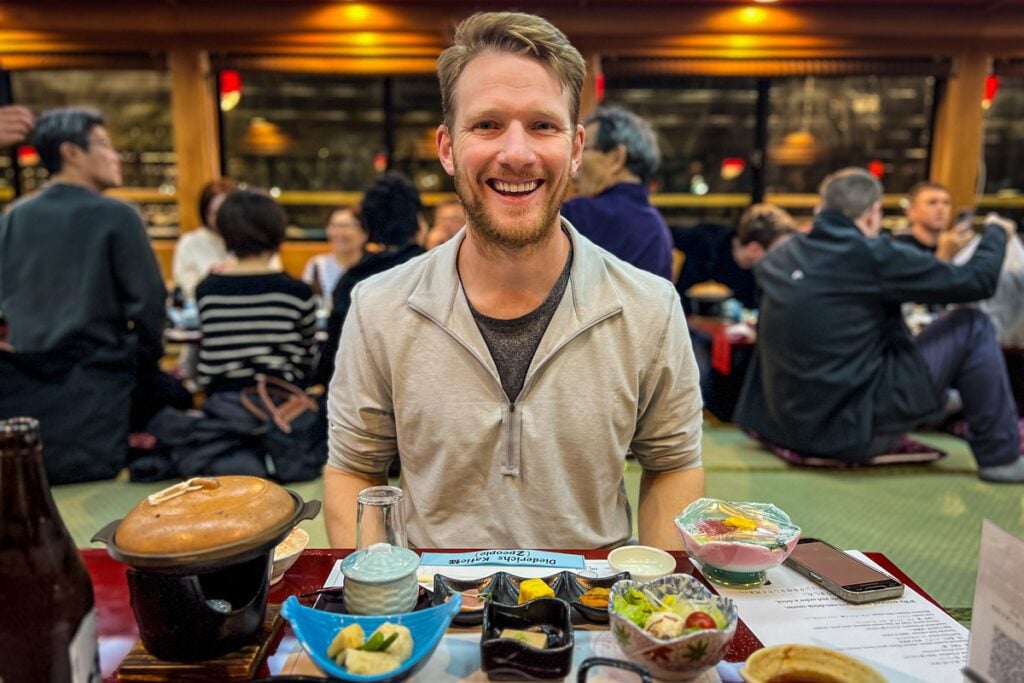
Japanese cuisine stretches far beyond the sushi rolls we’ve come to associate with this country. (Though of course you must try sushi from the source while you’re in Japan!) This article lists the foods you should definitely try in Japan!
And if you’re traveling to Japan with food allergies and wondering how that’s going to work, we have a whole section dedicated to dietary restrictions which walks you through what you need to know about Japanese cuisine and how to accommodate your allergies/restrictions in Japan.
Consider doing a food tour
If you want to try as much Japanese food as possible and learn about the cuisine on a deeper level, a food tour is where it’s at!
There are two companies that we trust above the rest for highly-rated food tours throughout Japan:
- Arigato Travel offers culinary and cultural experiences throughout Japan. We check them out anytime we are looking for Japanese cuisine specific tours.
- We did this Old Town Tokyo Food Tour and really enjoyed it because it was off the beaten path in a neighborhood we would never have explored otherwise.
- Magical Trip is our go-to for unique night time tours like bar and Izakaya hopping. One tour that looks particularly interesting is their Shinjuku food tour in Tokyo.
Traveling in Japan with kids
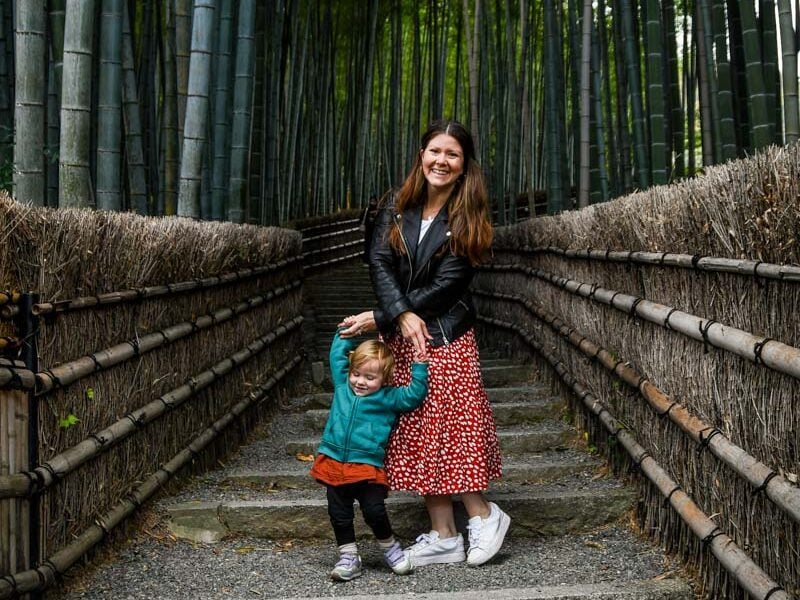
If you’re thinking about planning a family trip to Japan, you probably have all sorts of questions running through your mind.
Is Japan a good place to travel with kids? What will they eat? Where should we stay? What do I need to bring, and what can I buy in Japan?
On our third trip to Japan, we traveled with our then-2-year-old daughter. We asked ourselves all the same questions, and we have all the answers in our Japan family travel guide. But I’ll give you a spoiler alert right now: we think Japan is a fantastic place to travel with kids!
Japan trip ideas based on your interests
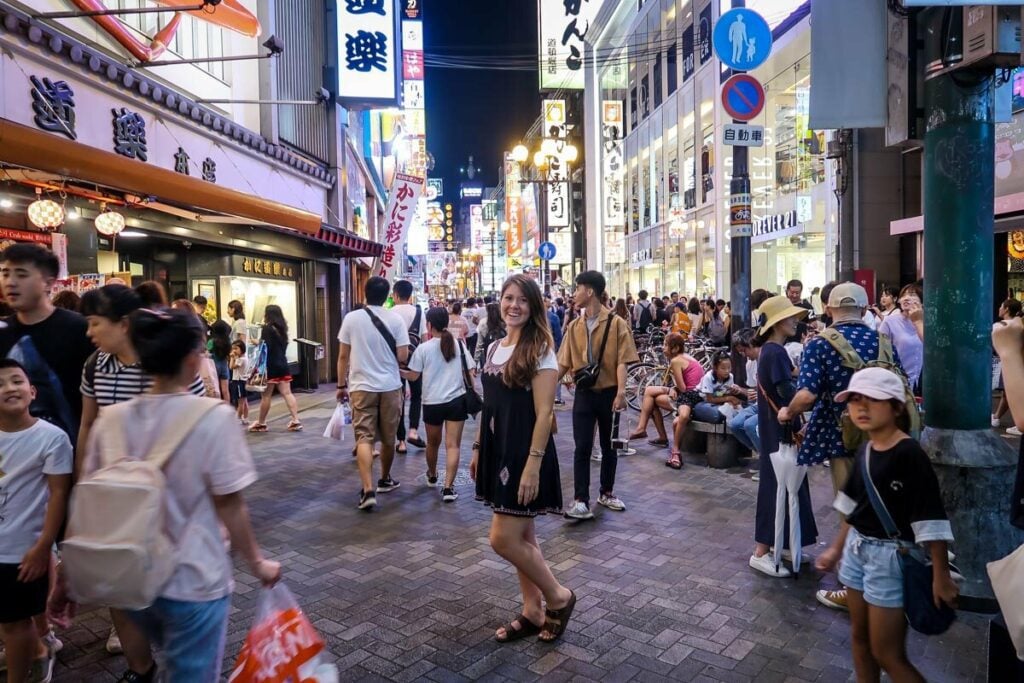
Japan is more than just its capital city. If it’s your first time traveling to the Land of the Rising Sun, we’d definitely recommend spending some time in Tokyo, as well as some of the other more well-known places like Kyoto and Osaka.
Perfect Japan itinerary
Want the perfect itinerary planned for you?

If you don’t have a ton of time to spend planning your Japan itinerary (or you just don’t find travel planning fun), we’ve got something you might be interested in…
We created the ultimate done-for-you Japan itinerary that is packed full of all sorts of tips we’ve gathered from 3 trips to Japan as well as literally hundreds of hours of research (no exaggeration).
We have both an off-the-beaten path route as well as a classic itinerary that hits the top attractions (perfect for your first visit to Japan!).
But, if you have been-there-done-that, or you have a lot of time to play with, check out our unique Japan itinerary ideas to get some inspiration.
What to pack for your Japan trip
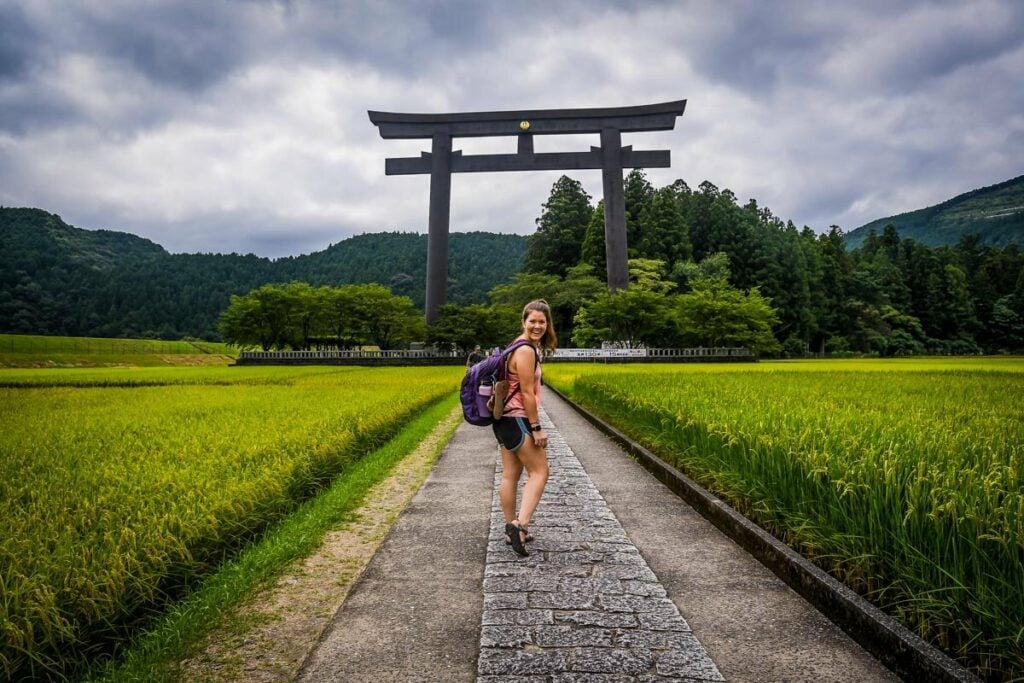
When deciding what to pack for your trip to Japan, a big thing to consider is the time of year you will be visiting. In the wintertime, for instance, you will encounter cold temperatures and will need warm clothing, whereas in summer the temperatures can be quite hot.
We created a whole guide to all the things you need to pack for Japan. Plus, we even have a (totally free!) packing list you can download!
This FREE PDF download includes everything you’re going to want to pack for your Japan trip, including what NOT to bring, plus tons of insider tips! Click the image below and fill out the form to get the packing list PDF sent straight into your inbox:
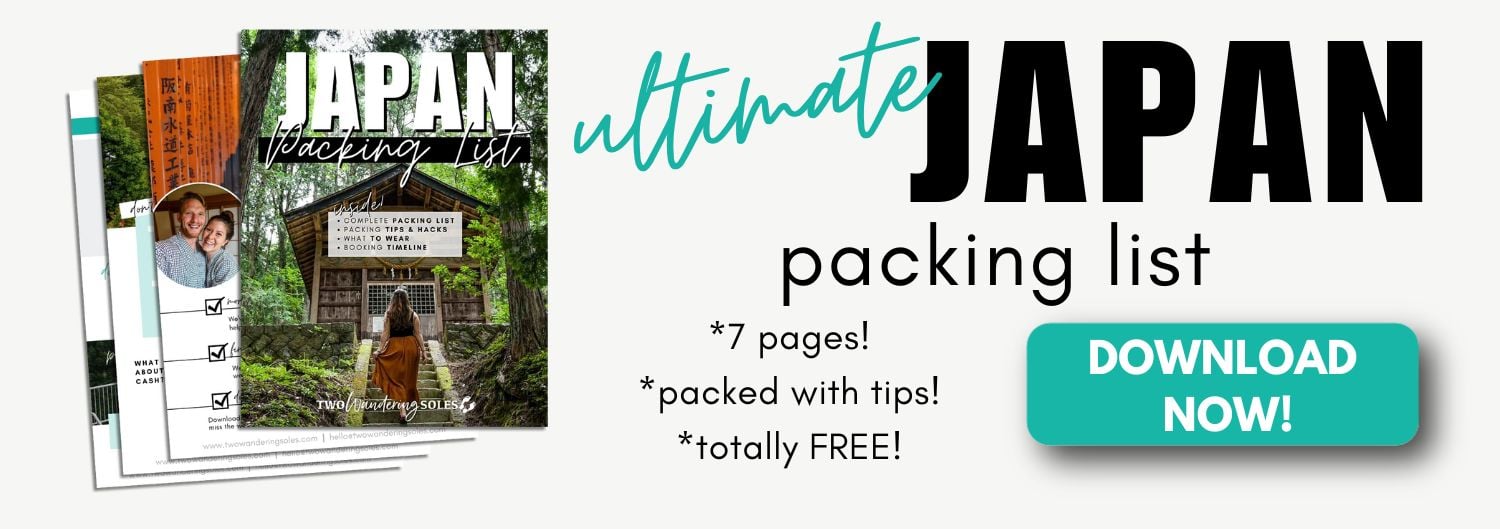
For more tips, check out our packing list for long term travel or the eco-friendly packing list full of travel gear that will minimize your footprint around Japan.
Here are some other items you’ll want to consider packing for your trip to Japan:
- Universal travel adapter: This adapter can plug in to Japanese outlets (and over 150 other countries outlets) safely.
- Away luggage: We recently jumped on the bandwagon and purchased our first Away bags and were not disappointed. These durable hard-sided roller bags come in lots of different sizes and with a lifetime guarantee, they are likely to be the last bags we ever need to purchase!
- Packing cubes: A backpacking staple, these cubes help keep your clothes organized in your bag.
- Power bank: It’s the worst when you arrive in a new city and your phone is dead. Keep it charged with an Anker Battery Pack, this one can charge your phone up to 7 times.
- Travel tripod: If you’re into photography…(if you want some travel photography tips, we’ve got you covered!)
Wondering what to wear in Japan? We have a guide that goes over exactly what clothing items to pack for each season, including lists for both women and men. We’ll help you build a capsule wardrobe for your trip and let you in on some cultural taboos you should be aware of.
What to buy in Japan
If you’re anything like us, you enjoy bringing back mementos from your travels to remind you of the places you’ve been. We have a great round up of things to buy in Japan, including plenty of unique ideas for Japanese souvenirs.
Plan your trip to Japan
After 3 trips (and counting!), we’ve fallen head over heels for Japan—and we’ve created TONS of resources to help you plan your dream trip. Start with our Ultimate Japan Travel Guide and be sure to check out these helpful articles:
- Here’s our curated list of the best things to do in Japan—from iconic sights to once-in-a-lifetime experiences.
- Use our Japan Rail Pass guide to determine if getting a train pass is optimal for your trip.
- Not sure where to go? Our Japan itinerary ideas will help you map it all out.
- Foodies, rejoice! This guide to what to eat in Japan will have you drooling before you land.
- This guide to what to wear in Japan (and what not to wear) will help you blend in.
- Use our ultimate Japan Packing List to make sure you don’t forget anything.
- Before you go, brush up on these essential Japan travel tips (including major do’s and don’ts!).
- Avoid awkward moments by brushing up on Japanese etiquette.
Still have questions? Drop us a comment—we LOVE helping travelers plan unforgettable trips to Japan!
Don’t miss your chance to grab our Japan Pocket Guide!
This FREE PDF download includes everything you’re going to want to pack for your Japan trip, including what NOT to bring, plus tons of insider tips!
Just enter your email and we’ll immediately send you access instructions!
Save this article on Pinterest for later!
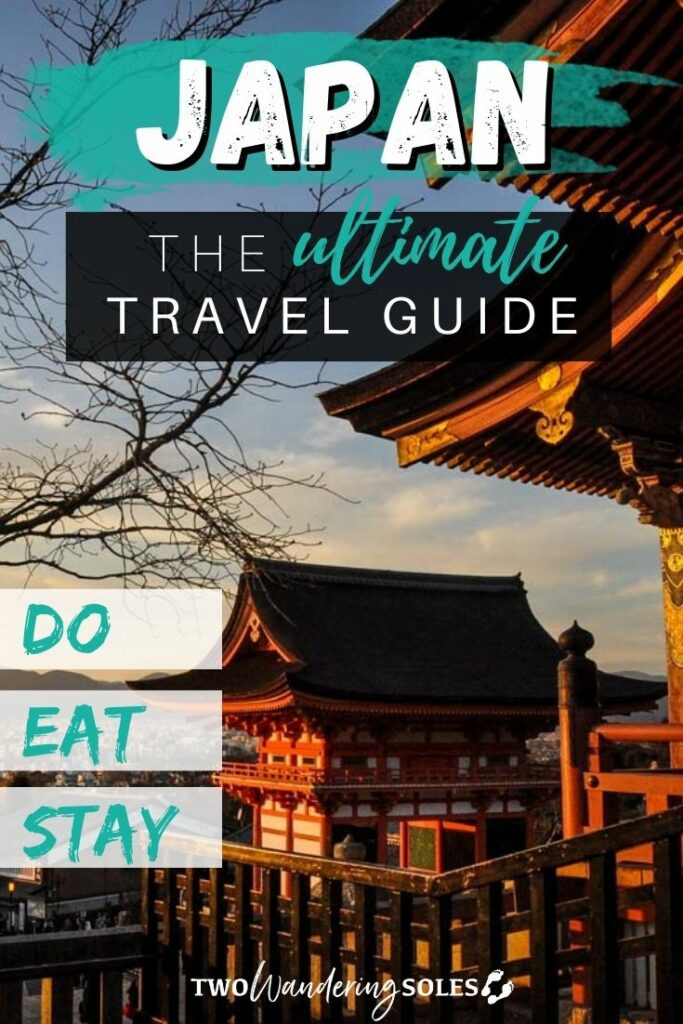
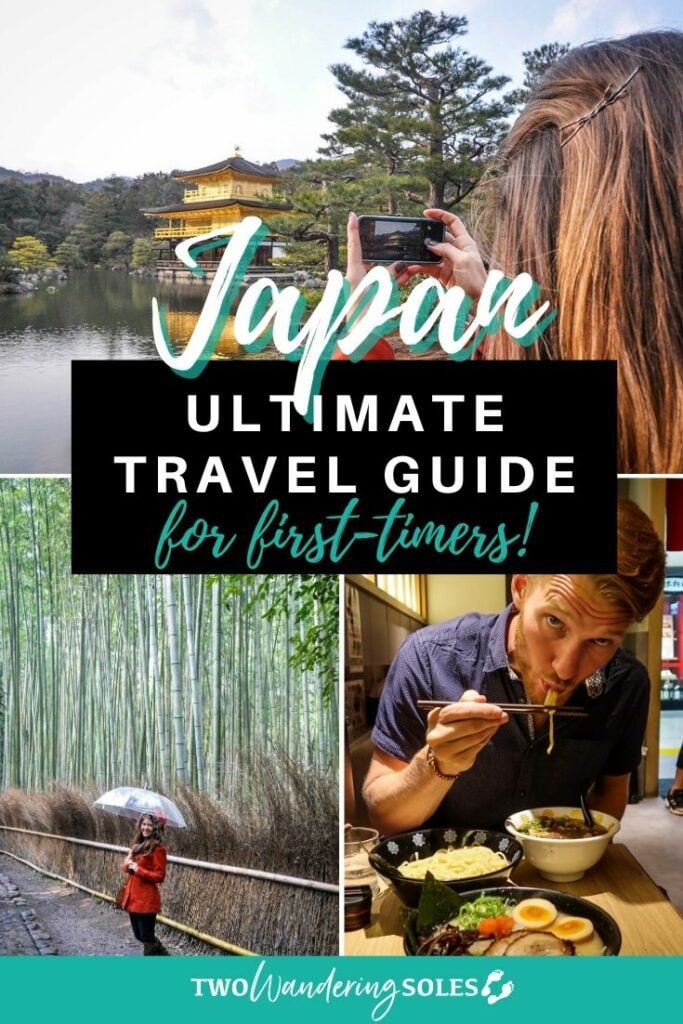
We want to hear from you!
Now that you’ve read through this extensive Japan trip planner, do you feel more prepared for your trip?! Is there anything we didn’t cover that you still have questions about? Comment below and we’ll try our very best to find the answer if we don’t know ourselves!

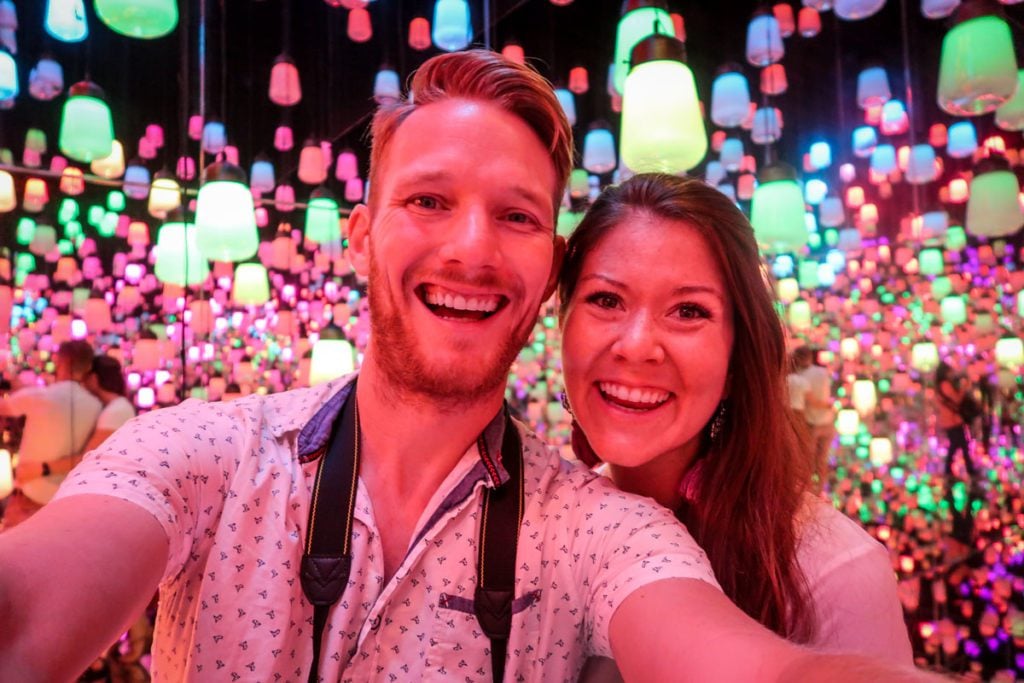
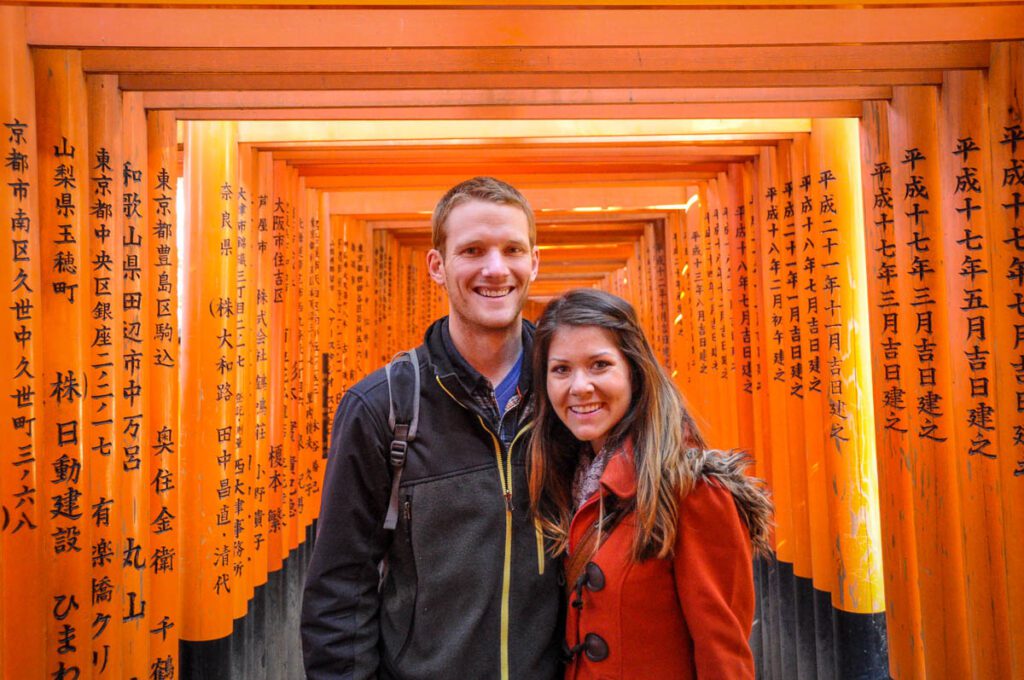
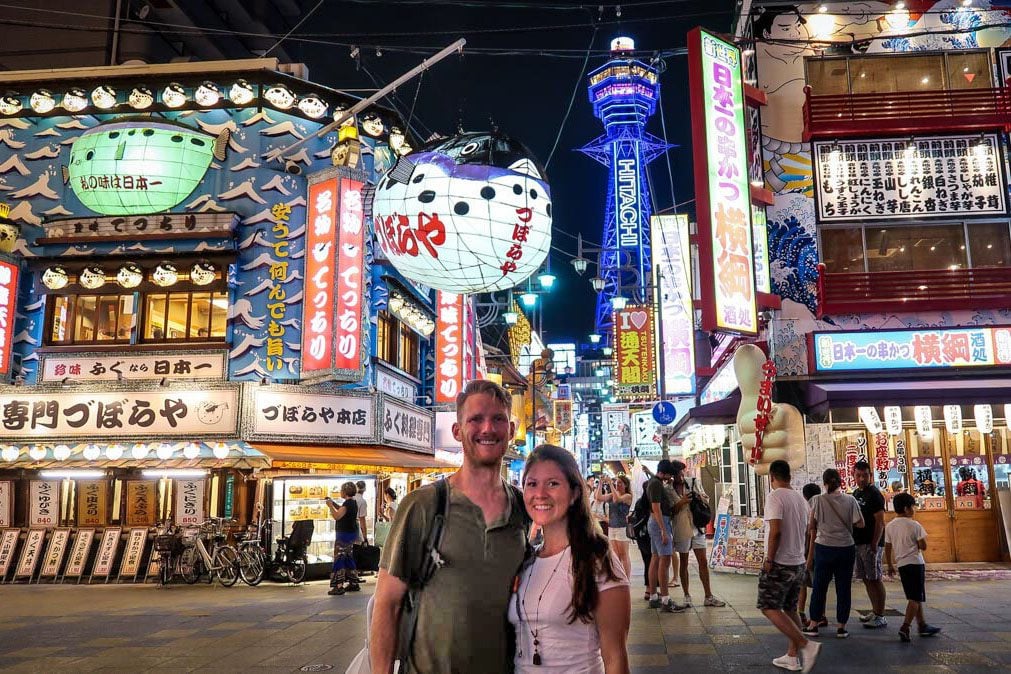
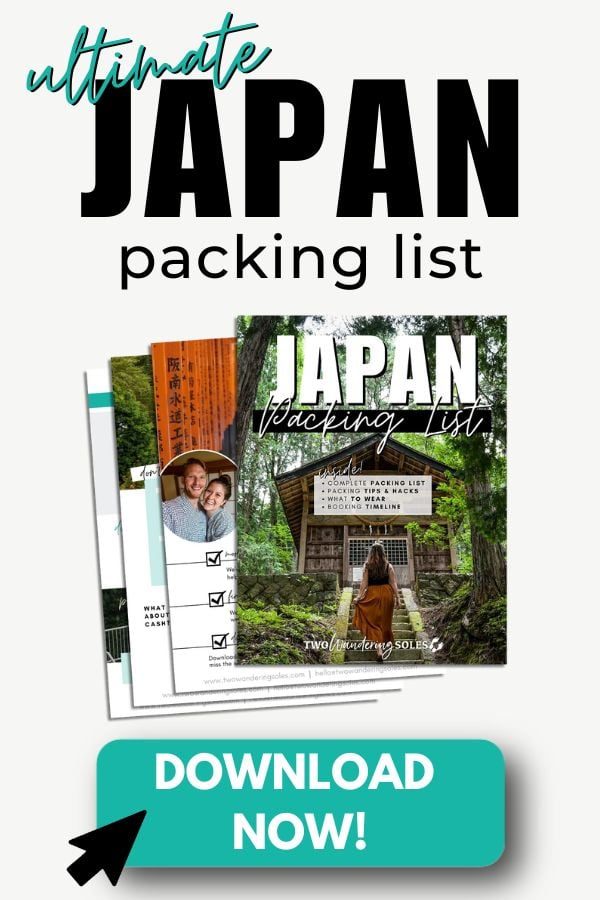
As someone that had lived in Okinawa (Military posting) for two years, I never got to travel around Japan. I’m planning on a trip next year. Should I have one AirBnB that I use as my ‘home’ for my trip (I’ll be in Japan for about 3 or 4 weeks) or should I only book spots for a couple of days while I travel around the country?
Very interesting article, thank you for sharing your travel experience to Japan. By reading this, I want to come to Japan. It’s nice to come there and feel the holiday atmosphere in Japan. landhoteldiever.nl
Wonderful post! Congratulations!
honestly WOW! this website is so useful and helpful and it has really, and I mean REALLY good info on Japan. This has helped me so much to plan my dream trip to Japan and I thank you both! Katie and Ben! for taking the time to share your experience and your knowledge that ultimately helped me in so many ways! THANK YOU!! ♥♥♥♥♥♥♥♥♥♥♥♥
Outstanding vacation point. Great!
Great Post. Thanks for sharing Great information about Japan tour, The travel experience is great.
Thanks so much for your nice comment! Cheers!
Hey Guys, I just have to say "hats off" on this guide… "Ultimate Guides" are so misused and the term gets thrown around so much it’s nice to actually see one that’s this robust!
Thanks so much Sara! Are you planning a trip to Japan soon? Let us know if you have any more questions. Cheers!
Love this article!
Thanks for sharing.
You are very welcome Agen! Let us know if you have any questions!
a very extraordinary website ! your discussion is really very helpful. thank you very much for what you convey. Good luck always.
Thank you so much for your nice comment, we really appreciate it. Let us know if you have any questions about traveling in Japan!
Hi
Really grate information. you have done your best.
I hope one day I can afford it to take a short trip to Japan
which is my wonder land.
I have been reading Japanese for a while.
(Mai asa watash wa nihon go benki shimasu)
(domo arigato gozaimasu)
Nice Post. best information about Japan tour, Japan is technology city. The travel experience is great.
Thanks so much for your nice comment!
Planning to visit Japan in autumn of 2019, found a lot of interesting information and some very good suggestions/tips here, thanks!
You are very welcome Mari! Hope you have a great trip to Japan!
Wow, thanks for sharing Katie and Ben, this is insanely detailed and covers everything a traveller needs!
If we may add just add some safety issues for fellow travellers to watch out for, mainly do be aware of some of the bar scams and bill padding that happen in Roppongi and Shinjuku, as well as donation touts/scammers. May everyone enjoy Japan!
Thanks for the tip David, but from our experience we didn’t see any scams while traveling in Japan.
Will be using this in the future with specific items to get before hand. Traveling to Japan alone and for the first time in a couple months. Extremely excited and nervous ? Thank you!
Hey Cody, Thanks for the comment. Traveling to Japan solo can seem intimidating, but it is totally possible. Let us know if you have any questions, we would be happy to help. Cheers, Ben
what’s your camera and lens? 🙂
We have a Nikon D7500 DSLR camera that we take most of our photos with. If you want more tips on travel photography, you might want to check out our article on it. Let us know if you have any questions. Cheers!
Oh my your post is verrrrrryyyyy informative. I wish I saw this before our trip. Anyhow, will keep this in my bookmarks for my future travels in Japan. Thanks a lot.
Dang, sorry you missed it. Hopefully it will be a good start for your next trip!